#your protagonist never has to question his way of thinking because the one person that calls out his bullshit
Explore tagged Tumblr posts
Text
writing a fic about something you legit dislike but see potential in is so trippy because I FORGET some things aren't cannon and it makes me so upset
you have a necromancer who is a medic. extremely well versed in human anatomy -> and you have implications that he's scared of death because his necromancy always gave him false hope that you can take death away. he can never truly bring something to life and it haunts him. AND YOU DON'T EXPLOOOOORE THAT CONCEPT?!?!?!?!? he's one of your main characters and you just dgaf??? he DOESN'T have a character arc like...at fucking all. and add onto that that the enitre series hes treated like an asshole and insensitive for telling it like it is like NO WHY ARE YOU BOOING HIM HES RIGHT
#every time i remember the canon for this it makes me so upset like you set up such an interesting concept but throw it all away in favor#of your angsty teen white boy protg being OP and correct and unchallenged the entire time#your protagonist never has to question his way of thinking because the one person that calls out his bullshit#is portrayed like an asshole#and the OTHER person that is like 'hey maybe the mc's plan is bad and we could all die actually' is treated like an idot coward#even though he's also completely correct#and dont get me started on how the female characters are portrayed- i don't think i can name 3 traits for one of the main side characters#pissing me off fr
10 notes
·
View notes
Note
do you think you could write a little scenario about how leona, azul, jamil, idia, and cater would deal with a sudden bout of cuteness aggression. like they feel that there’s just something about reader right then and there that is so unexplainably adorable that they experience the overwhelming urge to physically express it. thank you!!
Azul Ashengrotto:
Azul is the slightest bit irritated by this sudden bought of cuteness aggression, this overwhelming affection completely foreign to him. He doesn’t like that a person has this much control over him, enough to send him spiraling just from a playful smile or silly joke. He considered telling you to leave his office because you were thoroughly distracting him from his work, giving into the conversation you had started that was based on some odd hypothetical. He can’t deny how cute it is when you get excited at him indulging you, knowing he was only digging a deeper hole.
Cater Diamond:
Cater doesn’t have an issue with expressing how cute he thinks you are, even when it overwhelmed him like a slap to the face. He has an entire private album, never posted, of candid pics of you living your daily life (taken when inspiration struck, aka the cuteness aggression bug). You would dare to say most of them are boring, alluding to this being the reason he didn’t post them like he did everything else. It made him pout as you couldn’t be father from the truth! Those were his, for his eyes only to enjoy, and he couldn’t let anyone else see how cute you were when you didn’t even realize.
Idia Shroud:
Idia has to cover his face, almost curling up into a tiny ball as you look on in confusion. He couldn’t look at you a single second longer or he might explode, losing all coolness points he’s earned (if any, but he couldn’t take the chance). The tips of his hair give him away as usual but even as you question what might be wrong, he thinks how cute it is that you’re concerned with him. Perhaps he wasn’t the protagonist but one of many love interests, and you had so thoroughly maxed out his love levels that everything you did raised his affection to this unbearable point.
Jamil Viper:
Jamil does have the tendency to get swept up in emotion, and while he’s generally more reserved with showing affection, the cuteness overload always gets to him. You’re always surprised when he randomly squeezes you in a tight hug from behind, thinking his last name should’ve been considered a warning to any who knew him. You’ll never receive an answer as to why he did this, with Jamil hiding his face in your shoulder to put off meeting your curious gaze until he could think of a way to change topics.
Leona Kingscholar:
Leona moved so quickly it reminded you that he was a carnivore, a predator, ready to strike at a moment’s notice. His hands grip your face and force you to stare into his eyes, your heart jumping in your chest at the intense look on his face. His own expression remained neutral but it seemed he was looking for something, observing the small details of your face, eyes settling longest on your lips before they drifted up again to meet your gaze. When it seemed you were about to ask a question Leona crushed his lips against yours to silence you, not wanting to answer a single question about his sudden need to be close.
#Twisted Wonderland#TWST#Twisted Wonderland Imagines#Twisted Wonderland x Reader#TWST Imagines#TWST x Reader#leona kingscholar#jamil viper#cater diamond#azul ashengrotto#idia shroud#leona kingscholar x reader#jamil viper x reader#idia shroud x reader#azul ashengrotto x reader#cater diamond x reader
2K notes
·
View notes
Text
I've been thinking a lot today about how easily people condemn Solas for making the choices he did or for so regularly refusing the help and love his friends or a romanced Lavellan extended to him and how that's a very easy thing to do from behind a screen in a fictional game where you are able to (with very few exceptions) curate a world in which your allies are loyal and your decisions will go the way you'd like them to.
And yeah, it's a game and that's kind of the point, but if I were to look at it a little more deeply (and who am I kidding, I got back on this website exclusively to process the aftermath of Veilguard) I'd say that there's so much to be found in wondering if the protagonists in any of the other games would have fared better in similar conditions.
Apparently I can't stop making long posts, so buckle in.
What would Morrigan have become in a world where the Warden never stumbled upon her cottage with Flemeth, if she never got the chance to see more of the world and decide what she wanted out of it? With just her mother (who, coincidentally in this Solas-y discussion is also kind of Mythal) and no support, who is to say what she would have unleashed upon the Korcari Wilds one day when the confines of her cage became too much?
What about Leliana? She, too, suffered at the hands of a very controlling abuser who tried to convince her that one lifestyle was all that her future held. What do we think she would have become if not for a chance meeting in Lothering with someone who could help her face down the woman that molded her?
Fenris, a character MANY people are just fine with was incredibly ready to kill a mage on sight if need be, no questions asked. Where do we think his story goes if he doesn't have someone in his corner early on enough in the game? If he doesn't get caught by Danarius, he's almost certainly going to end up on a murder spree, and he doesn't even have Justice whispering in his head to do it.
Cullen. Just all of him. It's an absolute miracle he hasn't snapped by the time you encounter him in Inquistion, and even then you get the benefit of intervening at a critical point in his story several times over.
Almost every other character could face this analysis and I think we'd reach a result that suggests perhaps the only thing keeping them lovable is your playable character's investment in their well-being.
Enter Solas. We don't meet him when he's twenty to thirty something and on the precipice of falling down a dark path. He's been there for literal millennia already, and with the exception of one close friend he's been alone. And not even Felassan is enough because of the years Mythal had prior to that friendship to make Solas exactly who she needed him to be.
I've had shit friends before that aren't just good at isolating people, they're naturals. I barely made it through high school with my mental health in place (in fact, looking back, it almost certainly wasn't). When you think you've got a true friend and they need something of you, it's so easy to blindly follow them because you think your love is enough to mark someone's soul as trustworthy. Solas doesn't learn that lesson until it's too late, and even when he does he can't turn back: the spirit that was once Wisdom has been exposed to several of the worst ancient elves to ever exist and now he has to stand his ground rather than let it all fall, because that is what Pride would dictate. Admitting that the person you gave your love and labor and time to is a monster is hard. And he was alone.
Give me Morrigan after centuries with her mother. Show me Leliana after the years have become a blur and the only voice whispering in her ear is Marjolaine's. Show me the innocent mages that don't make it through if all Fenris has for years and years and years are the scars Danaris left him and the means to make more. Show me Cullen if he stays in a chain of command under a Knight Commander who knows exactly what he fears and holds it over his head for so long he forgets what it was like to be an excited kid begging the templars for training because he just wants to keep people safe.
We get companions in these games who are broken by the time they're twenty. Solas has spent thousands of years in servitude to a cause of a woman he believed to be his only friend. He doesn't know who he is without her influence, anymore, only exists physically in the first place because she asked it of him and then asked again and again and again. He doesn't have a witty band of merry fools to pull him out of that cycle. He has Felassan, but he has him during war after war after war in the hopes of freeing others from the very situation that torments him.
Trauma from war affects everyone touched by it, nevermind the fact that Solas is actively responsible for saving the lives of thousands and feels each life like a weight around his neck because maybe he can save them like he cannot save himself. We should always be worried about the people trying to do the most good. Who is looking out for them? Why are they so determined to help others? Could it be that it's something they wish others had done for them?
Solas certainly feels comradery with Felassan from working together to free slaves from the very people he helped put in power because Mythal told him it would be okay only to leave him with the pieces, but even the Solas that Felassan knows has been turned into an attack dog shying away from the touch of the very person it desires to be near above all others by the time their relationship forms.
The fact that Solas is able to try and show the Inquisitor who he is at all is a miracle as far as I'm concerned, a sign of a peaceful spirit of Wisdom who loves knowledge for the sake of it finally sensing that there might be a chance to embrace its nature again.
Yeah, if you give him what he has come to expect from people with power, if you let near-absolute power over the masses corrupt you, he's going to bristle and try to shut your inquisitor down.
But if you show him even the smallest bit of kindness? If you treat him like the starving wolf he talks about and feed him instead of fighting him? God, it shatters his entire existence.
It's called a cycle of abuse for a reason. Finding friendship, finding the love of your long-ass life can be the first step in realizing there's better out there. But the time it takes to learn that? When you're too weary to even reach out for help in the first place and afraid of every kind word or gesture because you've never known such tenderness (on a platonic OR romantic level, both matter so so much) before?
Part of the compelling tragedy of Solas is that it's almost Orpheus-like how he knows what he has been made into and still cannot stop himself from yearning for more, from turning around to see if just this once something has changed. You can't convince me that he hasn't spent years hoping that someone will hear the legend of the Dread Wolf and see it for what it is, a leash the Evanuris created for Mythal's whipping boy to ensure that even if he ever escapes them, the people he fought to save will hate him. And I cannot blame him for the shock and terror that consumes him when he realizes someone finally has.
You give me any of dragon age companions after the amount of time Solas spent under Mythal's thumb without your character's intervention and you tell me how that looks.
You tell me if they're able to change at the first sign of something that feels too good to be true.
And then, I want you to tell me they're any less worthy of trying to save, especially when you know how good their best can be.
Solas might be hard for some fans to love, but it's only because he serves as the perfect representation of the beast we are all capable of becoming when the love that sustains us, assuming we receive any at all, is laced with poison.
The journey out of that place, out of a literal prison of regret, is brutal, and I'm thrilled that even with the many things about Veilguard I'm still struggling with, we have the chance to let Solas try again with the help of those who love him not because he never fell down, but because they believe in the beauty of a future where he gets back up again.
#solas#solas meta#solas spoilers#dragon age#dragon age the veilguard#solavellan#morrigan#lavellan#datv spoilers#datv#dragon age the veilguard spoilers#mythal#felassan#dragon age spoilers#dragon age meta#veilguard#fenris#cullen#leliana#varric#varric tethras
302 notes
·
View notes
Note
Hello..If you don't mind, can I ask your top 5 (or top 3) favorite characters from SVSSS? And why you loved them? And your top 5 favorite moments from the series?
Also, if you don't mind me asking (again), what do you think are Shen Yuan and Luo Binghe's greatest personality strengths and weaknesses? Why? What do you love about their dynamic? Sorry if you've answered these questions before.....
Okay that would take FOREVER so I'll just do my top 5 fav characters and my fav scenes with them
5. Ning Yingying - she's sooo silly... it was so wonderful being introduced to her and seeing her as a dumb airhead who unknowingly gets people in trouble (the pendant incident) and watching her overtime become someone responsible.

OKAYYYY QUEEN i just know she would run Qing Jing peak like it's the navy.. Also very important to me that although she gets serious when the time calls for it, her personality still has remnants of that silly girl we were first introduced to (for example during the return to childhood extra where she assumes a grown ass child is Shen Yuan's baby)
4. Original Luo Binghe
i could spend HOURS talking about how tragic his life was but honestly my reason for liking him as a character is really simple. He gets horny for people who are nice

The fact that he knew the original goods for YEARS and then Shen Yuan gave him cuddles and Bingge went "wait actually Shen Qingqiu is kind of hot??" Real as fuck . I just know after he returned to his world it was like
Bingge: you would be sexier if you were sweet and kind
Sha Hualing: im sorry do you KNOW who you're asking this of
3. Shang Qinghua is... way too real. I feel like everyone can relate to him, especially with how terrible the world is right now. He can't do anything to go against the plot he himself wrote. He's the painful mixure of "if only I had done that differently" and "I can't do anything at all" that everyone experiences.

Moments like this, such as Shang Qinghua interrupting Bingqiu's honeymoon really make his character even more tragic. Without Mobei-Jun, he doesn't really have a place to go... he didn't take the offer to return to his homeworld because there was no one waiting for him there. Even when he's having dinner with his friend, he knows he can't ask for more because sticking around would annoy Binghe. Just kind of wandering around alone and seeing other people be happy together and have a place to go sucks ://
2. My second favourite scene and my second favourite character: Luo Binghe

This scene really made me love SVSSS because it's so rare to find media where characters are actually allowed to be human and insecure. Like I know we call Binghe manipulative and toxic (and he is!) but EVERYONE has at some point in their life felt like they hate them self and no one loves them.
The fact that Luo Binghe has these emotions and they're relevant to the plot is so special to me. It's so disillusioning when a character goes through trauma after trauma and it's never talked about. Binghe going "shizun I hate myself and I want to end the world about it" was just.. *chef's kiss*
My favourite scene byfar: Shen Yuan hugging Binghe in Shen Jiu's memories



I think this was the final nail in the coffin for making me love Shen Yuan.
For all that he insists, "I'm just farming points so the protagonist won't kill me!" when he's put in a situation like this, he's more loving than ever. He can't touch Binghe, but all he wants to do is wipe his tears. It pains him so much to see his dear disciple hurt and vulnerable that he can't do anything but kneel down and try to hug an image of the past. He knows Binghe can't hear him but still tries to comfort him.
"Shizun will never hit you again." is a line that absolutely makes me go crazy, because Shen Yuan was never the one who hit Binghe, that was the original goods. He doesn't care if Binghe knows that it wasn't him who hurt him. All he cares about is making sure Binghe knows it will never happen again, and that Shen Yuan will love and protect him.
Shen Yuan tries so sooo hard to come across as a "reasonable" character but he can't hide how sentimental and emotional he is. He'll complain about how the characters in PIDW don't use their brain, but then you show him a memory of a crying child and say "this happened in the past and there's nothing you can do about it" and he'll still try to hug that child and tell them to stop crying and that they'll be okay. God I love Shen Yuan
233 notes
·
View notes
Text
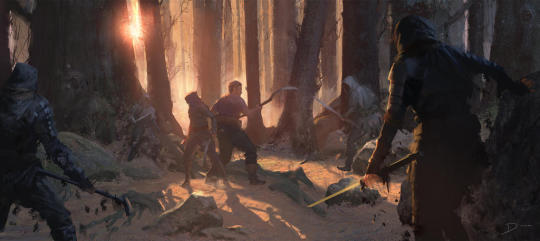
Monsters Reimagined: Bandits
As a game of heroic fantasy that centers so primarily on combat, D&D is more often than not a game about righteous violence, which is why I spend so much time thinking about the targets of that violence. Every piece of media made by humans is a thing created from conscious or unconscious design, it’s saying something whether or not its creators intended it to do so.
Tolkien made his characters peaceloving and pastoral, and coded his embodiment of evil as powerhungry, warlike, and industrial. When d&d directly cribbed from Tolkien's work it purposely changed those enemies to be primitive tribespeople who were resentful of the riches the “civilized” races possessed. Was this intentional? None can say, but as a text d&d says something decidedly different than Tolkien.
That's why today I want to talk about bandits, the historical concept of being an “outlaw”, and how media uses crime to “un-person” certain classes of people in order to give heroes a target to beat up.
Tldr: despite presenting bandits as a generic threat, most d&d scenarios never go into detail about what causes bandits to exist, merely presuming the existence of outlaws up to no good that the heroes should feel no qualms about slaughtering. If your story is going to stand up to the scrutiny of your players however, you need to be aware of WHY these individuals have been driven to banditry, rather than defaulting to “they broke the law so they deserve what’s coming to them.”
I got to thinking about writing this post when playing a modded version of fallout 4, an npc offhndedly mentioned to me that raiders (the postapoc bandit rebrand) were too lazy to do any farming and it was good that I’d offed them by the dozens so that they wouldn’t make trouble for those that did.
That gave me pause, fallout takes place in an irradiated wasteland where folks struggle to survive but this mod was specifically about rebuilding infrastructure like farms and ensuring people had enough to get by. Lack of resources to go around was a specific justification for why raiders existed in the first place, but as the setting became more arable the mod-author had to create an excuse why the bandit’s didn’t give up their violent ways and start a nice little coop, settling on them being inherently lazy , dumb, and psychopathic.
This is exactly how d&d has historically painted most of its “monstrous humanoid” enemies. Because the game is ostensibly about combat the authors need to give you reasons why a peaceful solution is impossible, why the orcs, goblins, gnolls (and yes, bandits), can’t just integrate with the local town or find a nice stretch of wilderness to build their own settlement on and manage in accordance with their needs. They go so far in this justification that they end up (accidently or not) recreating a lot of IRL arguments for persecution and genocide.
Bandits are interesting because much like cultists, it’s a descriptor that’s used to unperson groups of characters who would traditionally be inside the “not ontologically evil” bubble that’s applied to d&d’s protagonists. Break the law or worship the wrong god says d&d and you’re just as worth killing as the mindless minions of darkness, your only purpose to serve as a target of the protagonist’s righteous violence.
The way we get around this self-justification pitfall and get back to our cool fantasy action game is to relentlessly question authority, not only inside the game but the authors too. We have to interrogate anyone who'd show us evil and direct our outrage a certain way because if we don't we end up with crusades, pogroms, and Qanon.
With that ethical pill out of the way, I thought I’d dive into a listing of different historical groups that we might call “Bandits” at one time or another and what worldbuilding conceits their existence necessitates.
Brigands: By and large the most common sort of “bandit” you’re going to see are former soldiers left over from wars, often with a social gap between them and the people they’re raiding that prevents reintegration ( IE: They’re from a foreign land and can’t speak the local tongue, their side lost and now they’re considered outlaws, they’re mercenaries who have been stiffed on their contract). Justifying why brigands are out brigading is as easy as asking yourself “What were the most recent conflicts in this region and who was fighting them?”. There’s also something to say about how a life of trauma and violence can be hard to leave even after the battle is over, which is why you historically tend to see lots of gangs and paramilitary groups pop up in the wake of conflict.
Raiders: fundamentally the thing that has caused cultures to raid eachother since the dawn of time is sacristy. When the threat of starvation looms it’s far easier to justify potentially throwing your life away if it means securing enough food to last you and those close to you through the next year/season/day. Raider cultures develop in biomes that don’t support steady agriculture, or in times where famine, war, climate change, or disease make the harvests unreliable. They tend to target neighboring cultures that DO have reliable harvests which is why you frequently see raiders emerging from “the barbaric frontier” to raid “civilization” that just so happens to occupy the space of a reliably fertile river valley. When thinking about including raiders in your story, consider what environmental forces have caused this most recent and previous raids, as well as consider how frequent raiding has shaped the targeted society. Frequent attacks by raiders is how we get walled palaces and warrior classes after all, so this shit is important.
Slavers: Just like raiding, most cultures have engaged in slavery at one point or another, which is a matter I get into here. While raiders taking captives is not uncommon, actively attacking people for slaves is something that starts occurring once you have a built up slave market, necessitating the existence of at least one or more hierarchical societies that need more disposable workers than then their lower class is capable of providing. The roman legion and its constant campaigns was the apparatus by which the imperium fed its insatiable need for cheap slave labor. Subsistence raiders generally don’t take slaves en masse unless they know somewhere to sell them, because if you’re having trouble feeding your own people you’re not going to capture more ( this is what d&d gets wrong about monstrous humanoids most of the time).
Tax Farmers: special mention to this underused classic, where gangs of toughs would bid to see who could collect money for government officials, and then proceed to ransack the realm looking to squeeze as much money out of the people as possible. This tends to happen in areas where the state apparatus is stretched too thin or is too lighthanded to have established enduring means of funding. Tax farmers are a great one-two punch for campaigns where you want your party to be set up against a corrupt authority: our heroes defeat the marauding bandits and then oh-no, turns out they were not only sanctioned by the government but backed by an influential political figure who you’ve just punched in the coinpurse. If tax farming exists it means the government is strong enough to need a yearly budget but not so established (at least in the local region) that it’s developed a reliably peaceful method of maintaining it.
Robber Baron: Though the term is now synonymous with ruthless industrialists, it originated from the practice of shortmidned petty gentry (barons and knights and counts and the like) going out to extort and even rob THEIR OWN LANDS out of a desire for personal enrichment/boredom. Schemes can range from using their troops to shake down those who pass through their domain to outright murdering their own peasants for sport because you haven’t gotten to fight in a war for a while. Just as any greed or violence minded noble can be a robber baron so it doesn’t take that much of a storytelling leap but I encourage you to channel all your landlord hate into this one.
Rebels: More than just simple outlaws, rebels have a particular cause they’re a part of (just or otherwise) that puts them at odds with the reigning authority. They could violently support a disfavoured political faction, be acting out against a law they think is unjust, or hoping to break away from the authority entirely. Though attacks against those figures of authority are to be expected, it’s all too common for rebels to go onto praying on common folk for the sake of the cause. To make a group of rebels worth having in your campaign pinpoint an issue that two groups of people with their own distinct interests could disagree on, and then ratchet up the tension. Rebels have to be able to beleive in a cause, so they have to have an argument that supports them.
Remnants: Like a hybrid of brigands, rebels, and taxfarmers, Remnants represent a previously legitimate system of authority that has since been replaced but not yet fully disappeared. This can happen either because the local authority has been replaced by something new (feudal nobles left out after a monarchy toppling revolution) or because it has faded entirely ( Colonial forces of an empire left to their own devices after the empire collapses). Remnants often sat at the top of social structures that had endured for generations and so still hold onto the ghost of power ( and the violence it can command) and the traditions that support it. Think about big changes that have happened in your world of late, are the remnants looking to overturn it? Win new privilege for themselves? Go overlooked by their new overlords?
Art
#monsters reimagined#bandits#dnd#dungeons and dragons#d&d#ttprg#pathfinder#heavy topics#monsters reimagined
1K notes
·
View notes
Note
Have you got any thoughts to share about Sphene? I saw your post about how misrepresented FFXIV’s female characters are, and I’ve been hoping to see anything more than the typical “Evil AI colonizer etc.” or “Tragic woman who can never change ever” or “Wuk Lamat’s girlfriend”. Maybe our interpretations will differ but I’ll be happy if you can provide anything more complex than those.
Sure! Throwing all this under a read-more for anyone who hasn't finished 7.0 yet. I think I'll probably expand on this more later but wanted to get initial thoughts down. (Note after writing: I meant this to be brief but uhhhh brevity is not my strong suit sorry. This take just sort of ends abruptly because I realize I'm rambling.) Again, spoilers through the end of 7.0 MSQ.
I think Sphene is the sharpest work the game has done yet in casting the antagonist as the noble double of the protagonist (a well it returns to a lot with Emet, and Zenos, and Golbez, and...). But because the protagonist here is Wuk Lamat and not the Warrior of Light, that's also a much more defined and interesting role. To me, Wuk Lamat is, above all, the Righteous Queen, who rules thoughtfully, wisely, and justly, and whose claim to the throne is justified by her moral clarity. Sphene, in turn, is also a wise and good queen, one who undertakes all her actions with her people first in her hearts, a sense of compassion towards all, and a clear eye for the consequences and costs of her intended course of action. And it leads to utter disaster, for her, her people, and the people of Tural. That rocks!
The first half of 7.0 is about justifying the fact that Wuk Lamat's going to be Dawnservant. Wuk Lamat is compassionate, curious, wise, and open-minded. She wins over rebels and malcontents not by asserting her authority or by strength of force, but by taking her obligations to them (as her subjects) seriously. She knows many of her subjects personally and takes a great interest in their lives, and she respects even those who openly oppose her.
And everything Wuk Lamat does, Sphene does to 11. Wuk Lamat respects her subject peoples and is curious about their cultures? Sphene forcibly annexes Yyasulani, but goes out of her way and expends Alexandria's limited resources to enable the remaining Xak Turali to live in their accustomed way if desired (…to the extent allowed by the new permanent lightning storms and the internal conflicts caused by regulator adoption). Wuk Lamat cares about her people not just in the abstract but as individuals? Sphene visits sick kids, knows them by name! Wuk Lamat understands the burden of rulership is too great and cedes half her power to her brother? Sphene recognizes her own weaknesses and makes a deal with the devil to keep Alexandria's culture alive! Wuk Lamat is willing to die for her people? Sphene will forcibly traumatize herself into being a better queen, if that's what rulership demands.
For an expansion that spends the first half being like "wow isn't this perfect candidate for the crown so likable and humble? wouldn't it be nice to be ruled by a good king?," it sure is funny that the final boss is THE QUEEN ETERNAL and she hits you with attacks like LEGITIMATE FORCE and ABSOLUTE AUTHORITY and ROYAL DOMAIN. This, to me, is Sphene's role: she complicates and questions the themes we've developed in the first half. Most importantly to me, she makes us ask: what is devotion to a people or culture even worth?
There's a thing I kept thinking of constantly during Dawntrail, not because I think it directly influenced the game in any way but because the parallels were so stark and startling. It's Jonathan Hickman's New Avengers #18 (2014). Truthfully, I'm not a big comics guy; I only know this sequence because Ta-Nehisi Coates cited it as inspiration for his Black Panther run on Twitter once (I also didn't read TNC's run, I was following him for politics talk). Forgive me, comics people, if I get any details wrong. The parallels are almost comical, though. It goes like this:
A superhuman secret society formed of some of the smartest heroes (and villains) in the land re-forms to oppose an existential threat caused by incursions from other dimensions that threaten to cause literal collisions between Earth and its alternate dimension counterparts. Seeing no other alternatives, they undertake work on a weapon to destroy these other worlds. T'challa—king of a fictional hyperadvanced nation called Wakanda, and also the superhuman Black Panther—meets with his ghostly predecessors, the previous Black Panthers/kings, for he fears the moral stain on his soul and the souls of the people of Wakanda, if they survive explicitly by killing their alternate counterparts, will be too heavy to bear. His ancestors are not impressed.
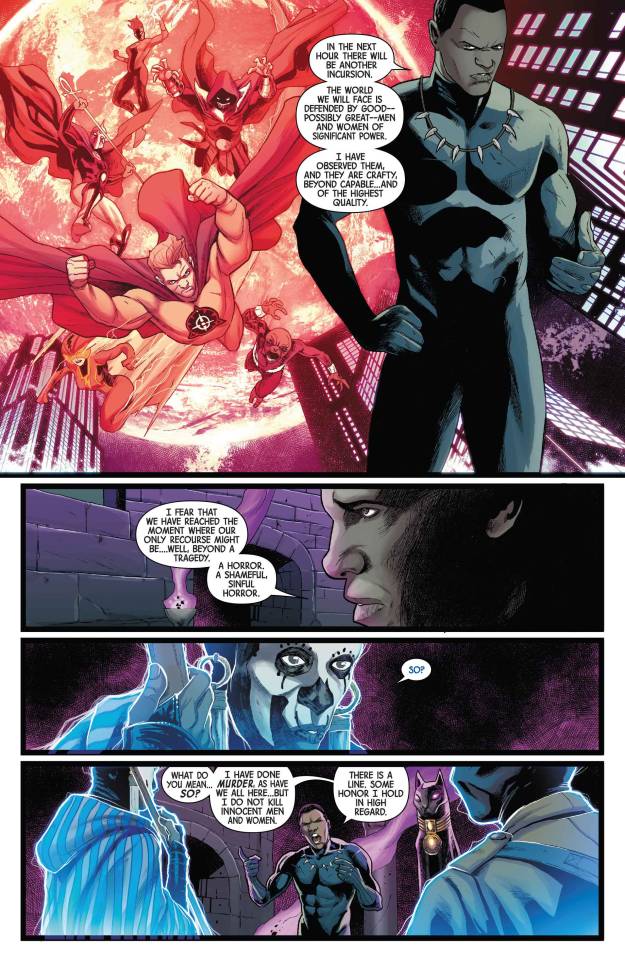
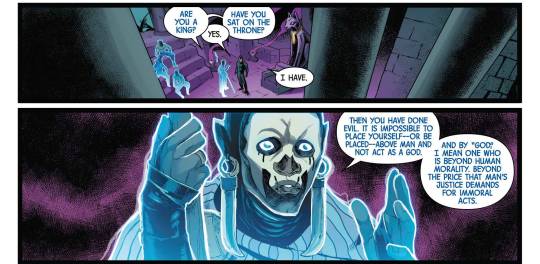
To them, there is no question at all. A king's duty may be complex in the execution, but it is simple in its conception. Your people come before all others. Always. This is, must be, the fundamental ethic of a good king. To do otherwise would be a betrayal of the social order on which this imagined good monarchy is built. In a situation like this, the only option is to do what you must to protect them. "Will there be a cost? Yes. Might the universe burn? Let it. . . . You will kill them all if it means Wakanda stands. The golden city must never fall."
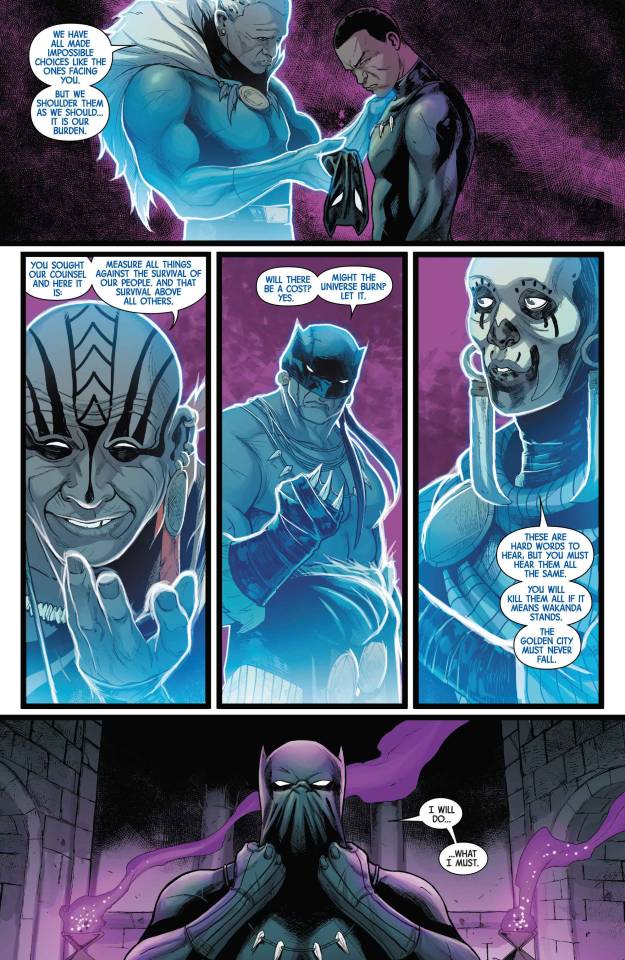
"I will do what I must" is Sphene's guiding principle. It is so important to her that when she recognizes that her sentimental attachments are making her waver in her duty, she severs them entirely, sacrificing her whole identity to the throne. It is also implicitly Wuk Lamat's position: she has no choice but to fight Sphene because to do otherwise would be to fail to protect her people. In fact, it's briefly even sort of the Warrior of Light's position, as when you tell Sphene before her trial that you understand what you must do, which is shut her down to protect others.

(One quick thought about the Warrior of Light: one cool thing about the antagonist this time being a double in a more exact way than Emet or Zenos is that it means other characters get a chance to relate to her differently than Wuk Lamat. The Warrior of Light, for example, is pressed into her service immediately upon your first meeting as the Queen's Champion, there to defend her if need be against all evil. This role is further affirmed by both robot Otis and Endless Otis, who essentially hand off their role as her knight to you, and reinforced when you flash back to the "might I call upon your aid" moment right before the end. Except, of course, you are loyal not just to her, but to the principles she represents, which her own acts betray, and so your ultimate act of aid is to essentially pass judgment on her and execute her. In a sense, you become the internal safeguard that a political system is supposed to have to protect against this very issue, and which Alexandria explicitly lost when it cast out/forgot Otis. Very Voeburt/ShB tank quests, it owns.)
But really, it's Sphene who embodies this sort of grim logic best. Aside from her transformation into the Queen Eternal, it's also why she suggests you simply become Alexandrians. It's the only way for her to reconcile her values and worldview, which have backed her into a corner where preserving Alexandria has come to mean a maximalist declaration of war on all life outside its borders because the kind of absolutely pain-free life she envisions for her citizens is completely unsustainable.
In this reading, one of Sphene's main beats is to unsettle what has preceded her in MSQ. In nearly all respects, she shares your values. She prizes life, is curious about other cultures, believes in the greatest good for the greatest possible number. But she is also a queen, and therefore irrevocably (in her eyes) tied to her state. Gulool Ja Ja and Wuk Lamat (and Koana) are the mythical wise rulers, thank god--but what if Wuk had inherited a Turali state that wasn't desperately in need of cross-cultural understanding, but one in a state of war? What value would her deep love for the people of Tural have held then? Sphene says, it would have held no value. If the survival of your people means harming the innocent, you harm the innocent. Kingship allows for no alternatives.

But she also concedes, in the very next breath, that she is still kind of wrong. Because what happened here was not inevitable, despite her programming (a brief note: to me Sphene being programmed is exactly the same as Emet being maybe-tempered, it's a fantasy gloss on the idea of social and cultural education. "I was programmed for this" is really no different from "I was trained and educated for this"), because the truth is that this kind of thoughtful, principled devotion to the state and its people is also a form of sentimental attachment, in the end. One that is maintained not because it is natural, and necessary, but because the monarch, too, likes it, and gets something from it.

In so many ways, in so many senses, the monarch is the state. Kings and queens may fancy themselves merely a reflection of their people's needs and desires, but of course even a cursory glance at history will tell you that far more often, states reflect their rulers. Sphene and Wuk Lamat both suggest that their conflict was inevitable, but was it? Or is the truth, as Sphene glancingly acknowledges here, that she turned her own fears and desires into the same policy goals that led to this tragedy? And if so...what does that say of our Good Queen, Wuk Lamat? Perhaps this could be different if they met earlier, says Wuk Lamat. But when? When did Wuk Lamat ever not love her people so dearly that she would not have sacrificed herself for them, or caused mass death for the sake of their survival? When did Sphene not believe the Endless to be people, or the preservation of Alexandria to be the most important thing? Maybe she means "had we met before you met Zoraal Ja," but of course, we the player actually saw their meeting. And we know that Sphene even then was not the hapless naif she'd like to pretend. She always knew exactly what she was doing.


We know the price of this kind of thinking, this Hobbesian view that states are engaged in a struggle of all against all. Living Memory lets you walk through it. To preserve Tural, we exterminate the Endless. We befriend them, learn about their lives, promise to remember them, and then we destroy them and their homes, leaving nothing but a bleak blank landscape and the sound of wind. This is what Sphene would have done to Tural and Eorzea. Indeed, it's what she's already doing to the people of Yyasulani, because no amount of well-intentioned aid can make up for trapping people under the dome for 30 years and systematically eroding their culture through the resonators.
To me, this is what makes Sphene really work, that way she has of forcing Wuk Lamat and the player to commit the same kinds of sins she has. We'd like to think ourselves better than her, but of course, we've already reconciled with and integrated Mamook's brutal eugenicist regime back into Turali society well before we ever met Sphene. At the end of our long "wow isn't having a wise queen cool???" expansion, we are met with "Legitimate Force" and "Absolute Authority" and see them for what they truly are: nothing but tools of violence. No longer does the idea of the Warrior of Light hanging around Tural as Wuk Lamat's advisor have the same attraction, now that we have been reminded of the way the putatively unquestionable logic of kingship can ultimately lock even the wisest and kindest rulers into a path of war and exploitation and destruction.
I think Sphene is FFXIV's most interesting and nuanced depiction yet of a leader. She really, truly, wants nothing more than to save her people and protect them from pain. But even seemingly loving and compassionate goals like these can readily lead us down dark paths. She's a "hard men make hard choices"-type character, a noble but misguided opponent, but as a loving and elegant fairy queen instead of a grizzled knight or extremely sad man. She fucking rocks.
#sphene#ffxiv#dawntrail spoilers#dt spoilers#spoilers#overtagging this one lmao#sphene alexandros xiv#meta: durai report
381 notes
·
View notes
Text
wandering like a ghost
SUO HAYATO. 1,4k word count. fluff, little touch of angst but nothing big
Summary: your stuck in spiral of worry for the unknown future. luckily, suo always there to anchor you back to his arms

“I'm afraid you'll disappear one day.”
“...pardon?”
Suo has that mysterious aura where anyone will look twice his way. The tassel golden earrings swaying to his steps. The leather eyepatch that leaves people wondering what he hides behind it. Especially the way he brings himself, calm and confident, but always stands on the sideline, like a perfect side protagonist material.
He stands out so much in the crowd, making it easier to find him if you ever lost from his hands. His voice cut out the air beneath both of your heads, and just like that–your eyes lay back to his calm and soft gaze. To you, Suo is the center of your attention, while other people didn’t notice his presence but notice how your eyes gleamed whenever you see him.
As though he's invisible to everyone's eyes. A wallflower. A slight crack in the sidewalk. A faint presence.
To you, Suo is the reason you found life even more enjoyable. At the same time, he’s a ghost, his presence is just another fleeting feeling you can only find in lost memories. To you, his existence will vanish in thin air, leaving you questions of self-doubt. Temporary.
He stands out too much; it feels like he will disappear after summer ends but doesn’t want other people to forget him just like that.
“Does it make sense?” you ask, feeling a little lost in your own thoughts.
Suo tilts his head. “I’m afraid I don’t understand what you are getting at.”
“Right? I don’t even know how to explain it clearly!” You tousle your hair frustratingly, as if that action can organize the clutter inside your head. “It’s just… um… it feels stupid.”
“No it isn’t.”
That soft voice calls you out again, followed by howling wind blows all frustration inside your chest, like the world heard your hidden prayers inside the crack of your heart. As if Suo possessed your body to give your silent plea to the universe.
The repetition word makes you feel even more childish, but there's no better word than to describe Suo's presence in your life. He's the perfect side character because he stands on the side, letting his friends drown under the spotlight, while he works in the shadows. The invisibility will turn into something more noticeable, too striking that you can't ever turn your eyes away from him.
Like that one single dot in your paper. So small yet able to capture your attention every time.
There is no passerby on the bridge, only you and Suo stand there without a care in the world. No hush of wind catches your ears or the streaming river beneath the bridge. Everything falls silent, giving you a space to breathe and think.
“There you again, belittle your feelings,” Suo reminds you, “It isn’t stupid.”
You pout. “Yeah, but it’s ridiculous. Laughable if other people hear it.”
Soft laughter falls between his lips. See? He proves your worry.
Suo’s features look delicate and untouchable, like an antique doll full of haunted rumors. You’re scared. The softness of his smile, gaze, and voice will go just like dust blows in the wind. He doesn't feel like a real person, just a faint memory of a stranger you would never believe if he didn't stand beside you, like right now.
Suo is that fleeting feeling that lingers in your hand. You don't understand it, not in a short time, but you crave it.
Fear guides your hand to his sleeve, holding on to it really tight, like a lost child glued to a trusted adult. Suo looks confused, his earrings dangling while his head comes back to its normal position.
One day, after the summer ends, every chat you have with Suo will be suddenly forgotten for years. The green “online” notification under his ID will vanish without any warning, leaving you wondering when he will come back. Without any “sorry” or “goodbye”, Suo will disappear from your life, making you question which part of you has pushed him away.
“Sweetheart–”
“I… I’m scared.” That word falls heavy from your tongue. “You feel like a summer ghost, but I know–our first meeting is not in that season, and yet,” your chest feels heavy too, “I feel like this will be our last summer.”
Suo blinks slowly. “Are you breaking up with me?”
“No!” you shout very loud, making all the birds sit in the bridge’s fence fly away by surprise. “I don’t want to break up with you–Oh God, that sounds pathetic. That’s not the point!”
“I see, so you’re afraid I’ll disappear one day?” His gentle smile still stays. You frown slightly, trying to understand the hidden meaning beneath his smile, which is pointless because you never succeed in revealing his secrets. “That really is a silly thought.”
“I know, it’s dumb, I know. You’re not gonna get kidnapped like that, damn, those kidnappers are probably the one who screwed up messing with you. I just think–”
“Oh, I wasn’t mocking that.”
Now it’s your turn feeling confused.
Before another question drops, Suo swiftly moves towards you, pushing all the distance away. A light kiss falls to the corner of your lips. It feels subtle, but more visible, as if the spirit wants other people to see it, wants you to remember his touch alone. His invisible form slowly morphed into something more solid, until you couldn’t see through his body. And just like that, he looks more human in your eyes; reachable, fragile, yet still mysterious.
Suo stays for awhile before pushing his head, giving back the distance you need to process what just happened.
“H-Huh?!” you yelp, touching the corner of your lips, feeling the warm heat creeping up slowly. A bright red spread like a black paint in white canvas. “W-What–What is wrong with you!”
“What am I to you?” Suo inquires, pushing your head to think of whatever answer to give.
“M-My boyfriend?”
Suo hums lightly, a satisfied grin tugging on his lips. Felt like a dream come true when you called him that. “That’s right, I’m your boyfriend. Do I feel like a ghost?”
You look down, realizing the tip of your feet touch his, then shake your head.
Sudden heavy fall beside your head. You peek from the corner of your eye, Suo lays his head to yours, fully realize how you blush furiously from the close proximity.
“Even if I disappear one day, I’ll find you again,” he says, full of meaning and emotion, giving no space for doubt filling your mind. “I can bear the thought you’ll get into trouble if I’m not there to protect you.”
“What am I? A kid?” you snarl.
“Sometimes,” Suo laughs, stroking your hair with the side of his head, like a cat giving you a light head bump. “You’ll cry if we’re apart for too long.”
Embarrassing memory creeping up to your brain. In your middle school days, you bawled your eyes out seeing Suo after the winter vacation ended. Was it relief? Was it longing? You couldn’t understand your younger self suddenly crying while holding onto Suo sleeve, as if you’re afraid he's gone in an instant, just like what you’re feeling a moment ago.
Suo put that moment as his core memory. If he wasn't stuck in a daze, he would probably take a picture of your swollen eyes. You want to punch him.
“I won’t cry like that again.”
“You won’t? That’s unfortunate,” he mumbles, “Because I miss you too that day. It's nice to know I'm not the only one who felt that way too.”
The sudden confession makes you surprised, but you stay still for the sake of Suo resting on your side longer.
“If one day I’ll disappear like a ghost, quoting from you, I’ll find a way to find you again.”
Your fingers intertwine with a subtle move from him. Summer evening feel a little warmer when Suo stays by your side. “Because you couldn’t bear to stay apart from me?”
Suo laughs quietly. “Yeah, I miss you easily, if you didn’t know that.” He leans even further into your warmth, very aware how your body starts leaning forward because of excessive heaviness. “What about you?”
“Me?”
“Yes, will you find me if I disappear one day?” Suo glances to your two thumbs playing together, going round-and-round in rhythmic movement to show your anxiety growing back at a slow pace. He takes both of your hands, giving a light squeeze of reassurance, and just like that your shoulder slacks in ease.
“Do-Do you want me to?” you stutter, doubtful tone in your voice could be heard. It’s been a long time since he heard you speak like that. It’s saddening to know you still see yourself that way; unwanted and alone.
Suo let out a genuine smile, the kind you always long for when you admire him from afar. “I don’t want it to be anyone else.”
#wind breaker#wind breaker x reader#wind breaker x you#wind breaker scenarios#suo hayato#suo hayato x reader#HE WILL BE THE DEATH OF ME
134 notes
·
View notes
Text
god, what happens next is so good. the character writing is just spectacular. it fascinates me just how much depth there is to each character and how that contributes to the story.
milo's dni is the most revealing thing about him, and it's the very first thing we hear from him:

right off the bat, we can see what kind of person the protagonist is. he's a pastel softboi trans man who clings to a childish aesthetic to appear weak and non-threatening. despite being involved in a toxic relationship with another trans guy who attempted to rape and kill an 11 year old girl when he was a teenager and later murdered his girlfriend, which milo helped with by dismembering her corpse, he puts "pedophiles and unhealthy pairing shippers dni" on his carrd. which, ok, maybe he wants to distance himself from people like griffin now - except that's not really true, because he talks to, moves in with, and regularly hangs out with a serial killer fan who idolizes griffin and is even dating the guy while he's in prison. he puts "being against neopronouns" and "anti-otherkin" on the same level as those things. he explicitly denies any responsibility in the murders of haylie and savannah, despite having literally chopped haylie's arm off. all the while, he has "you deserve to heal" in big bold letters, while not applying that belief to anyone but himself.
right from the start, it's obvious that milo is not a good person. but he's also humanized throughout the story. sure, some of his softboi persona is a means of victimizing himself to avoid taking responsibility for what he did - and you could make the case that he was a victim in some ways. on the other hand, he also never got to grow up because he spent 5 years in a psychiatric institute. is it any surprise that he clings to the same aesthetic, interests, and hobbies he had when he was 15? he never got to stop being a kid, and how is he supposed to now? he didn't graduate high school, he can't get a job, and nobody wants to be friends with him because of what he did. it raises uncomfortable questions - namely, what happens next? milo served his time for the crime he committed as a minor. he was already punished, but now he has to live the entire rest of his life. what is he supposed to do?
that, I think is the most interesting part of this story. almost every character in this story makes it hard for you to like them, but they also have very human reasons for doing the terrible things that they do. I'll talk about some of my favorites under the read more, but be aware that there will be spoilers:
claire is one of the most interesting characters to me, just because of how unlikable she is.

when we first see claire in victim impact statement, she tries to ignore haylie, griffin, and milo as much as possible. she doesn't even seem to like her sister. she treats haylie as a nuisance for coming into the room that they share as sisters. she doesn't want to go to the open mic night to listen to haylie play her ukulele. when she finds haylie bawling her eyes out in the bathroom at anime central, she just looks away, as if to say "you chose to date your shitty boyfriend". when she hears haylie and griffin fighting upstairs, she just pretends not to hear it. when haylie is curled up in terror later, claire puts on headphones and turns her back to her. her headphones become a way of drowning out haylie's screams when griffin is around, and because of that, she doesn't hear haylie screaming for her life, and ends up finding her corpse in the kitchen.
that's why I don't find it surprising at all that she becomes an outspoken transphobe who wants to take her anger out on the trans people who murdered her sister. she goes to media events and publicly degenders milo and griffin. she calls aaron's friends trannies. I think it's easy to misconstrue her as a terf, but she literally doesn't even pay lip service to feminism. how could she? she knew that her sister was being abused by her boyfriend, and she did nothing. let me remind you that she lives in a house where "smash the patriarchy" is embroidered on the wall. she doesn't care about any of that. she just wants a scapegoat. she wants to make the law impose harsher punishments on minors who commit violent crimes because she doesn't know what else to do with her life. she very clearly hates herself, becoming an alcoholic to cope with her guilt. she pretends to care about haylie and fight for this law because it's the only way she can convince herself she's a good person, even though she can see that doing what she's doing is turning everyone against her.
and then that brings us to audrey. it's difficult to like her, too, because she's dating claire despite all of the horrible things she's doing. but at the same time, I can see where she's coming from. her mother died of cancer and she and all of her other black siblings were adopted by conservative christian white parents. she's still christian to this day, and makes a point of separating herself from "criminals" by insisting that she has nothing to do with them because she goes to church and takes care of her family. she doesn't want to disavow the law that claire worked so hard to pass because at the end of the day, it won't affect her personally, even though she is aware that the justice system disproportionately punishes black people. she very clearly has a lot of internalized racism, and I think that's best exemplified in the way she draws herself. despite having pretty dark skin in real life, she draws herself as light skinned as claire, her white girlfriend:

like, it's hard to like audrey, but you can clearly see why she's made all of the decisions she has! she idolizes claire because it's her first lesbian relationship. the way she sees it, claire can do no wrong. audrey does actually seem to be aware that her girlfriend is doing terrible things, but she essentially just plugs her ears and tries to ignore it. that's why she doesn't go to claire's campaign events. she ignores all of her girlfriend's flaws because claire is essentially her savior. because she has claire, she doesn't have to go back to her family, to her abusive alcoholic white father. she doesn't have to actually take care of her younger siblings, which is a responsibility she's foisted off unto mark. that's why she ignores that claire is just as much of an emotional drain as her father. she's highly depressed, she's an alcoholic, she trashes their bedroom (leaving audrey to clean up after her mess), she puts up an emotional wall and dismisses audrey's attempts to comfort her, and dismisses audrey's own problems as being less traumatizing and less important. by all accounts, claire is a terrible girlfriend and a terrible person, but because audrey idolizes her as her savior, she stays by her side. I'm really looking forward to seeing how she reacts to claire's disappearance in future chapters.
and then of course, there's vikki. she's been doing something incredibly disrespectful for years by making true crime videos where she talks about the victims and killers like it's all a joke. she makes a video about whether ethical necrophilia is possible, and makes a callous, bitter joke that the concept of "respect for the dead" is antiquated, because nobody respects her as a trans woman of color even though she's still alive. for this comment, people have harassed her online endlessly, enough that she had to make a video called "STOP TELLING PEOPLE I FUCK CORPSES". that doesn't stop her from making a video about the murder of haylie, complete with an interview from milo. she'll throw him under the bus if it means getting the attention off herself for a bit.

and yet, I think out of everyone, I feel the most compassion for vikki. yes, she used milo for content and called him a "sad little blonde girl", but I can understand where she's coming from! like, again, she's a trans woman of color in the true crime community. she knows the archetype milo is trying so hard to be in order to avoid taking responsibility for what he did. like, I've personally seen trans women of color who are victimized by white trans men who pull the same exact shtick as milo over and over, so I completely understand her frustration. that said, she also realized she went too far and tried to apologize, only to find out she was blocked and that milo basically wrote a callout post against her. I think it says a lot that vikki was one of the only people to actually try to talk to milo, even if the way she went about it was wrong.
vikki does things that are disrespectful, but to be honest, it's not that surprising! she grew up in a 90% white town in the middle of nowhere, got assaulted by multiple white boys for being a faggot, got sent to alternative school, worked for a funeral home as a teenager, and transitioned. not only is she desensitized to death, she's angry that people revere the dead more than her.
it's astounding, really! what happens next is so well written because it makes you feel conflicted about each of its characters. what are we supposed to do with these people who do awful things? a lot of the intrigue in this comic comes from seeing how each of the characters handles this question as they deal with the other characters who have done terrible things, while they themselves are deeply flawed as well. I think the writing really forces you to contend with the idea that these are all still people, and that their humanity needs to be recognized even if they do terrible things. it makes you ask, what happens next?


176 notes
·
View notes
Note
I love love love the Disciple Shen Yuan au!!! It makes my brain go brr, I have so many questions… How does the game go when sqq pushed lbh into the Abyss? Is lbh obsessed with his kind shixiong? Does he ever find out the truth of what happens between sy and sqq?
How does sy feel when sqq is put in the water prison?
I also really love the Disciple Shen Yuan Au! I, however, have only authored one post about a disciple Shen Yuan, which does not make sense in the context of this ask. If you are, instead, refering to this post which I reblogged I would suggest sending the OP an ask about the details of their specific AU!
But if we're speaking more generally: personally I don't think a disciple AU shifts the way that Shen Yuan experiences the events of cannon all that much, at least as far as Lou Binghe is concerned. By the time Shen Yuan transmigrates his feelings toward and opinions of Lou Binghe are largely set. They do change over time, evolving from love of a favorite character to real romantic love, but never in a way that lessens Shen Yuan's love for him. I think the biggest change a disciple AU produces is a relationship between Shen Yuan and the Original Shen Qingqiu. It places him in the, very stressful, position of caring for the happiness and safety of two people who are diametrically opposed as a genre convention. The stallion protagonist who will have revenge and the villian who will only dig himself deeper. Of course Shen Yuan still does his best to protect Lou Binghe , but in a disciple AU he has different abilities, different social status, different power than his cannon self does. I think, given he can do nothing to prevent Shen Qingqiu from throwing Lou Binghe into the abyss he would largely react the same: like a widow who lost their soulmate. The difference is, in a disciple AU, he doesn't get to check out emotionally because he now has the added conflicting feeling of praying for and dreading Lou Binghe's return.
Lou Binghe would absolutely adore his kind shixiong tho. He would follow him around like a puppy. Oh, the only guy in your life who doesn't hate/bully you is also warm and caring and too pretty? Lou Binghe never stood a chance. How is he supposed to not be obsessed with the pretty older boy who makes sure he eats, and lets him borrow his bed, and helps fill in the gaps in his education, and makes sure he's out of sight when he knows their shizun is in a violent mood?
68 notes
·
View notes
Text
SHUT UP SHUT UP SHUT UUUUUPP!!!
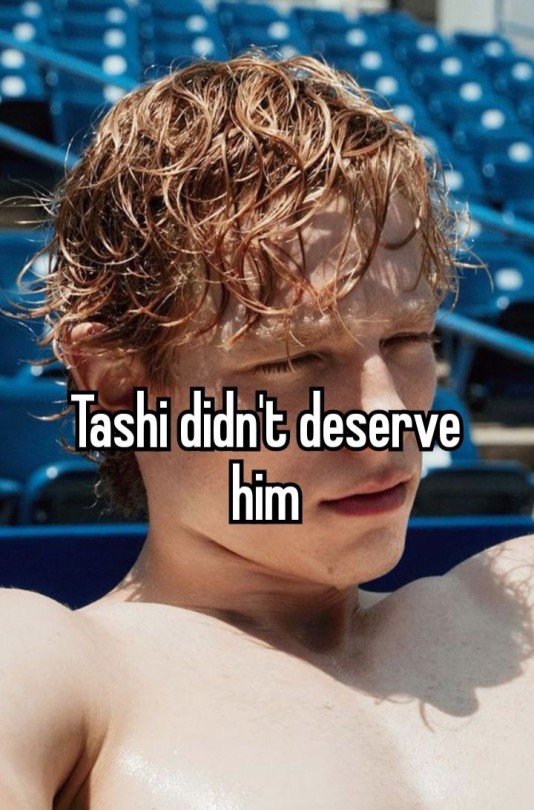
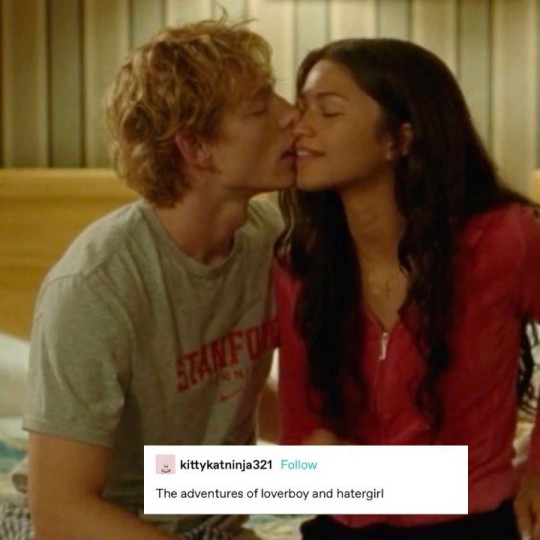
FOR ONCE STOP MAKING TASHI THE VILLAIN! Stop making Tashi look like the bad guy because you didn't get your gay ending! Stop making Tashi look like the bad guy because Art is depressed! Stop making Tashi look like the bad guy because Patrick is horny!
Instead of hating on her, I'm begging you, watch the movie again and try to pay attention to her character. I'm not saying she is a flawless angel - no - she has done many questionable and not always approved things, but so have Art and Patrick!
It's important to understand Tashi's full story and the actions which shaped her into the person she is. Some of you people seem to forget that she lost her biggest passion, that something that she loved deeply was taken away from her. Within a single moment, Tashi lost her career, lost her strength and all her desires. She became no one to herself, a failure and a completely miserable person.
Her behaviour is natural, and it's determined by everything she has gone through. It's very obvious she went through a rough time of depression and had to cope wirh the loss somehow. She's also just a human, and humans make mistakes.
Tashi loved both Art AND Patrick - and we can notice that very clearly in multiple scenes and if we think about it really deeply, and when she has married one, she couldn't just forget about the other. It's natural that she jumped towards the opportunity of spending some time with Patrick, even just one night (in 2011). Later on, she sleeps with Patrick again because she still loves him, but that doesn't deny that she loved Art and Lily too.
She's spent 8 years married to Art, every day of those eight years and I doubt she would have cheated on him with anyone else than Patrick. Let's not forget that Art is a flawed human too. He earned by Tashi as a result of his obsession and manipulation, which is a long way from love that they eventually found.
If Tashi didn't love Art, she would have abandoned him the moment she started seeing him on top of his career, because he had something she could never have again - tennis. But Tashi never left. She stayed and supported Art throughout the whole process, in her own way.
Stop praising Art for having a fat ass and looking up at his wife. He chose the life he's living, he chose to marry Tashi, have a family with her and pursue his tennis career with all the consequences. Yes, Art is depressed and miserable and he's probably not too happy with his life, but he's also an adult fully capable of making decisions. Just because he's submissive, loyal and dedicated, doesn't mean he deserves to be babied and told that he's too good for Tashi.
I don't always like to bring this topic into the discussion, but it's clear that some of you are pure misogynists, hating on the female protagonist because she got to fuck your favs and because she has a life. Tashi Duncan is somebody, she is a strong female lead with even stronger emotions, and if you really wanna understand her, you can't just watch - you need to think as well.
#challengers#challengers movie#tashi duncan#tashi duncan x patrick zweig#tashi duncan x art donaldson#zendaya#patrick zweig#art donaldson#luca guadagnino
110 notes
·
View notes
Text
Rewatching Link Click: Easter eggs in your noodle soup?
So I've just finished watching both seasons of Link Click/Shíguāng Dàilǐ-rén, which means that obviously I'm watching it all over again. What did you expect me to do, sit around waiting for Bridon arc while the Bilibili official account taunts us with replays??
Besides, Link Click is one of those dishes that is best served twice. The early episodes are packed with hints and foreshadowing that only become clear once you've gotten up to date, so I've made it my mission to catch 'em all.
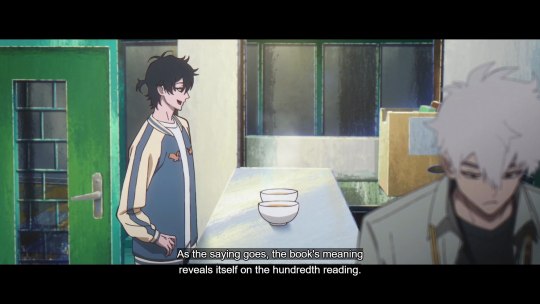
You don't say.
It's well known that certain early mini-arcs (for instance Chen Xiao's basketball match, and Doudou's kidnapping) have implications for the larger plotline or at least contain important exposition/character insights that the story would not feel complete without. There are also several that get written off as filler, or are generally considered to not have any purpose beyond familiarising the audience with the characters and setup, and lulling you into a false sense of comfort before everything goes to shit. Episode 2: Secret Recipe, AKA the Noodle Lesbians episode, beloved as it is, tends to fall into the second category.
Or does it?
On a rewatch, I still don't think it does anything to advance the main plot. We don't even really know where it fits into the timeline, because we're never told what day it is and Lu Guang's watch is never shown on screen (I'll get around to a longer analysis of this another day). However, I'm instead inclined to believe that it's one of the most important episodes in the show - if not THE most important - because it's essentially an allegory for the story of Cheng Xiaoshi and Lu Guang, and gives you a bird's eye view of how the relationship between them is going to develop - which, as you know, is what the show is all about. And the fact that it's not situated in a specific time, in a show that cares heavily about timeline construction, makes it better.
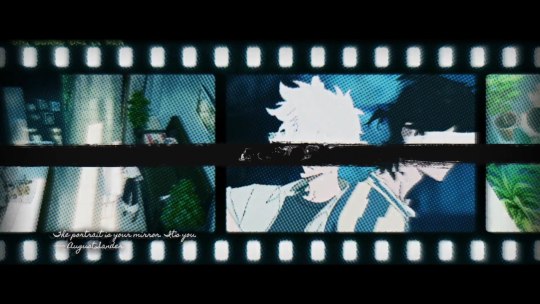
The episode starts with this quote from German photographer August Sander, who believed that, through photography, he could reveal the characteristic traits of people. "The portrait is your mirror. It's you." It's pretty explicit, when you think about it. This episode is a mirror of the entire series, specifically of its protagonists.
Moving on. The episode's storyline is quite simple: two college "roommates" start a noodle shop together, and as time passes, they drift apart and eventually fall out as their priorities change. Yu Xia, the business-oriented one between them, wants to get hold of the secret ingredient used by Lin Zhen, to whose cooking the shop attributes its success. Does Yu Xia really want to steal the secret recipe? Or is it just one of the many things that the quieter Lin Zhen keeps hidden from her that she desperately wants to know, along with everything that went wrong between them? Your guess is as good as mine. Either way, there are lots of indirect parallels between Xialin of the noodle shop and Shiguang of the photo studio, even if for now they're very distinct individuals with their own personalities and struggles. It does, however, give some indication of what's to come.
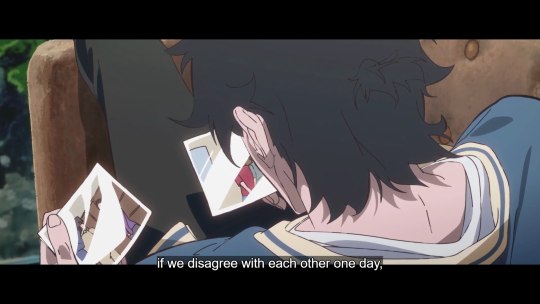
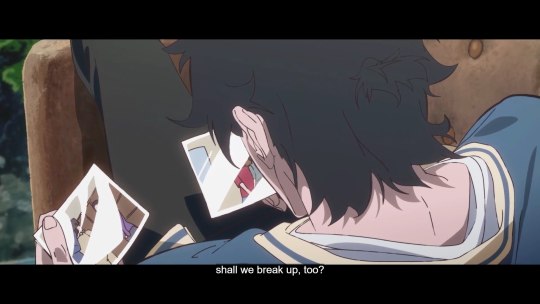
This question isn't purely rhetorical, as we find out in the very next arc, where Cheng Xiaoshi has a fight with Lu Guang over letting his client's loved ones perish in the Wenchuan earthquake. Even if they eventually come to a consensus, they have fundamentally different life philosophies and approach their missions in very different ways. Cheng Xiaoshi is a hyperempathetic idealist who keeps trying to use his forays back into the past to fix his clients' personal problems, while Lu Guang remains utterly indifferent and staunchly against interfering, even in life-or-death situations. Which turns out to be a facade, because we later learn that he's just as much of a meddler as Cheng Xiaoshi - except he's focused on a singular, selfish goal, which is to keep Cheng Xiaoshi alive at any cost.
Let's go back to the noodle shop. After ten years of running the business together, it becomes clear that the ladies' aspirations are no longer compatible. Yu Xia has big plans for the shop. She wants to broaden their customer base - for profit, of course, but also so that more people can be made happy by the chance to taste their noodles. Lin Zhen's dreams, however, are on a smaller scale - perhaps only on a personal scale. Throughout the episode, it seems that she only really cares about making noodles for one person.
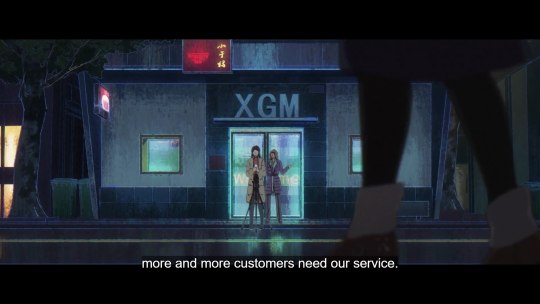
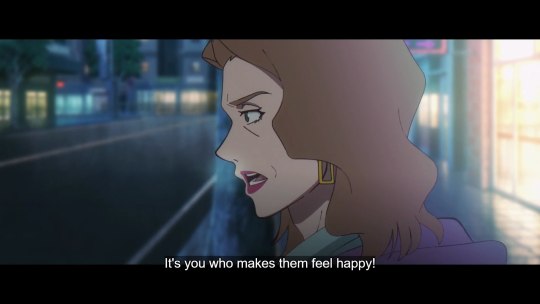
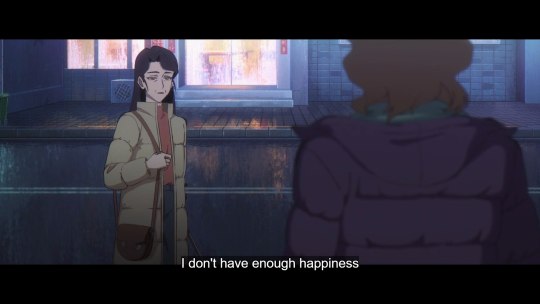
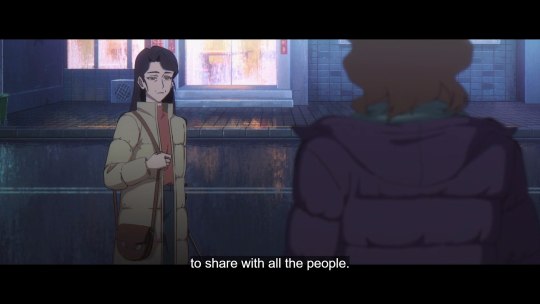
Sound familiar?
At the risk of digressing, it needs to be said that Yu Xia and Lin Zhen are absolutely very much a WLW couple. This isn't bait, it's elegant and really quite unsubtle queercoding that says 'to hell with censorship' loud and clear. Honeymoon jokes, the taxi driver assuming Lin Zhen had fought with her husband, and Lin Zhen's very bold attempts at flirting... we see you.
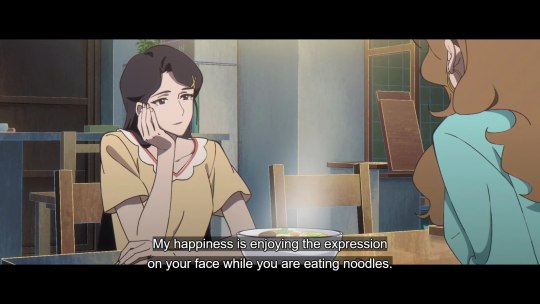
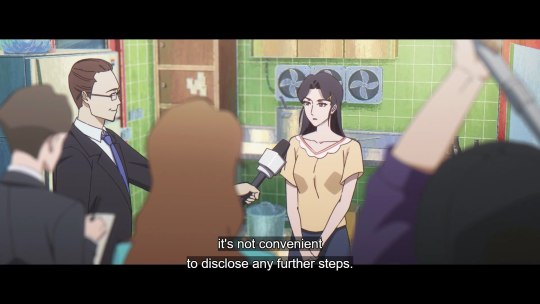
More to the point of this post, I think it's important to point out that Lin Zhen does not actually care for too many people other than Yu Xia. She's all worn out from making noodles for customers, but she forgets all about that when it's time to make a bowl for Yu Xia. She also keeps her special ingredient - which is one of the secrets she shares with Yu Xia, as we find out - highly guarded. She's never going to let these pesky reporters in on something so intimate.
Why is this important? Because, as it turns out, the episode's storyline - and Lin Zhen's motives - are all about saving Yu Xia.


We learn that the secret ingredient is a local specialty from Yu Xia's hometown. Lin Zhen has been using it for years, keeping the taste of home alive while Yu Xia's drifted further and further from home to the point where she can no longer remember where the ingredient came from. At the end of it all, when Yu Xia returns home, she finds Lin Zhen there waiting for her. Lin Zhen, mind you, does not hail from the same town. The girls met in college. It's home to her simply because it's Yu Xia's home.
This comes directly after a pilot episode that establishes the contrast between urban isolation and rural/familial warmth, through Emma's eyes, and in a show that continually reinforces the concept of longing for home and loved ones. By forcing Yu Xia to reevaluate her priorities, Lin Zhen manages to bring her back home - which is a place that includes herself.
Perhaps it's too early to say. But to me, it's a pretty neat thematic parallel of Lu Guang's solo quest to save Cheng Xiaoshi from death; which is intertwined with a greater goal of giving Cheng Xiaoshi a home, one that is safe and secure and surrounds him with those that love him and are there to stay.
But in the process of achieving this, one of his biggest obstacles is Cheng Xiaoshi himself - his insistence on interfering with the timeline so that Lu Guang can't predict events with certainty, his objections to the way Lu Guang does things, and the definite resistance Lu Guang will come up against if Cheng Xiaoshi learns about his plan. Pretty much every minor mission they undertake is a rehash of the same argument; Cheng Xiaoshi wants to use their combined powers to make a difference to other people's lives, and Lu Guang just has one goal in mind which means that he's going to ignore absolutely everyone else.
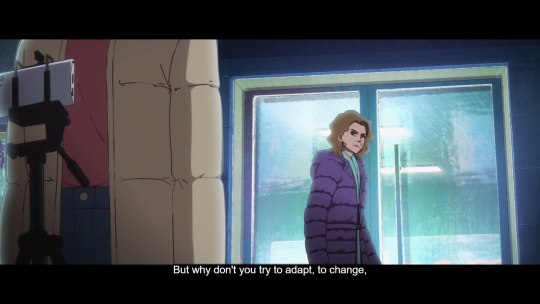
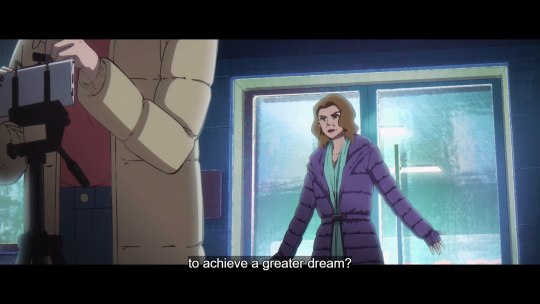
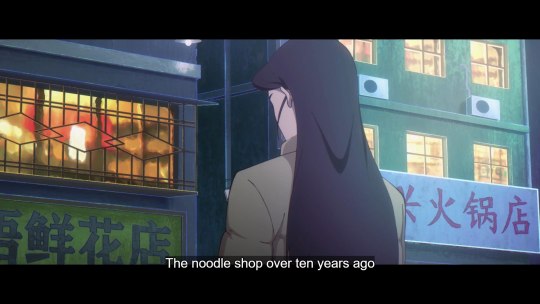
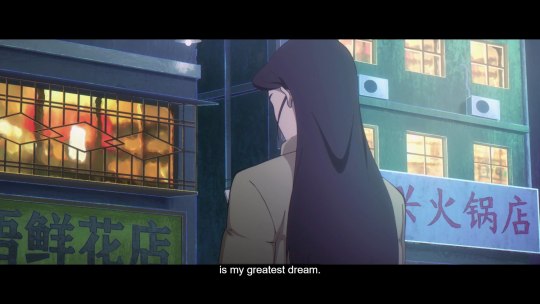
Notice how Yu Xia's looking to the future, while Lin Zhen's dream is to go back to a point in the past? Neat.
And when they finally part ways because it's clear Yu Xia is not going to support Lin Zhen's goal? Yu Xia asks her where she's going to go after they part ways, and Lin Zhen says:
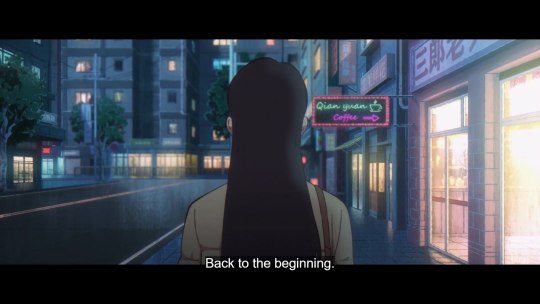
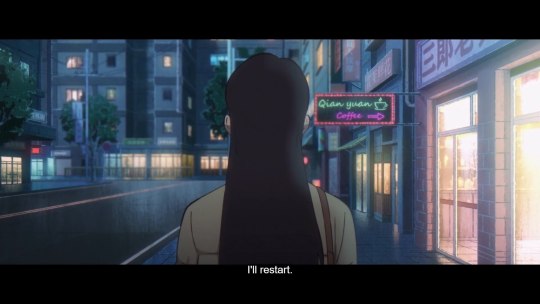
I wonder where we've heard that before.
And if you need any more proof that this episode is in fact intended to be a mirror, do consider:
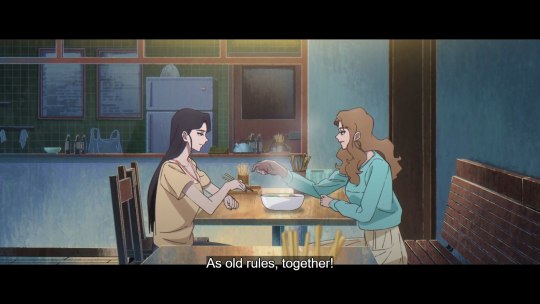
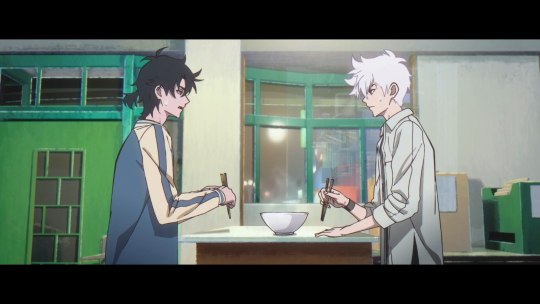
Their seating positions are mirrored too. Yeeeeaaaaaahhhh.
In conclusion: if this allegory is to be believed, then trust that Lu Guang will eventually succeed in his mission and Cheng Xiaoshi will find his way home to him. It'll happen, guys. In the meantime, at least our beloved noodle ladies will be living a peaceful life out in the countryside.
Since I don't know how to shut up and this website seems to be giving me infinite space to yap, let me include some more details about this episode that I found cool. There are so many.
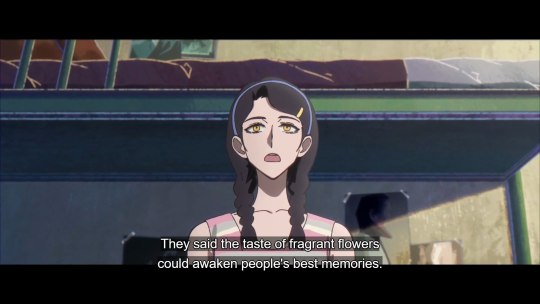
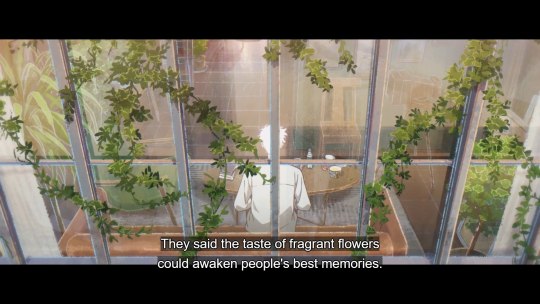
Lin Zhen and Lu Guang are both shown while this line is being said. What with all that the fragrant flowers represent, it makes you think about what these characters' best memories might be and how much they treasure them.
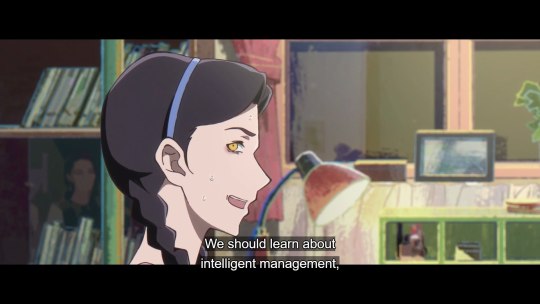
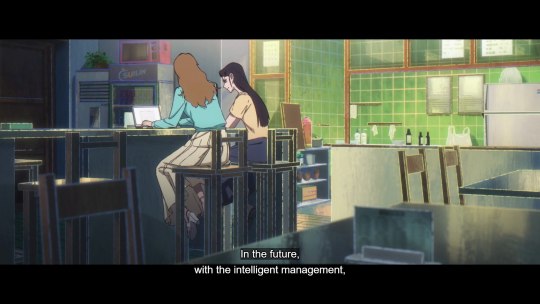
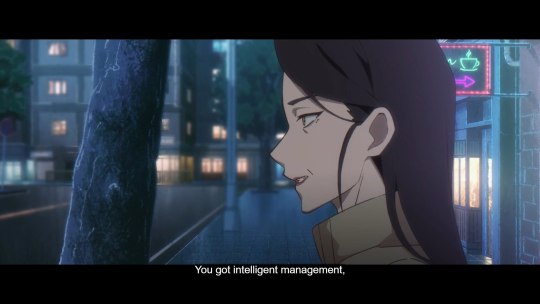
This is such a tiny detail that you'd almost definitely miss it on the first watch, and it seems insignificant - until it isn't. When Cheng Xiaoshi hops into the girls' picture taken during their college days, he screws up and suggests they'd be better off dabbling in tech stuff like apps or intelligent management than running a noodle shop. Lu Guang makes him quickly eat his words, but they seem to have still struck a chord with Yu Xia - because later we see that she works over years to integrate an intelligent supply chain management system into their business. In fact, one of the reasons for Lin Zhen to alienate herself from the business is because she feels like it's gotten too techy and lost its human touch. Not really fair considering it was her own idea, is it?
I mean. This is probably a stretch. Digitization is pretty inevitable for big businesses nowadays, so Yu Xia, being as enterprising as she is, might have gone for it whether Lin Zhen suggested it or not. But it's interesting to think that it might be Cheng Xiaoshi's tiny alteration of the past that unfurled outwards like a hurricane from the beating of a butterfly's wing and catalysed their falling out. Especially because these kinds of bootstrap phenomena very much occur in later episodes and are a core feature of Link Click's time travel model.
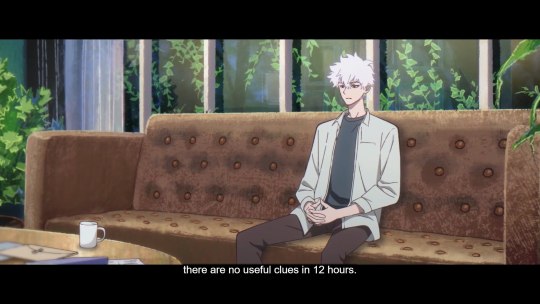
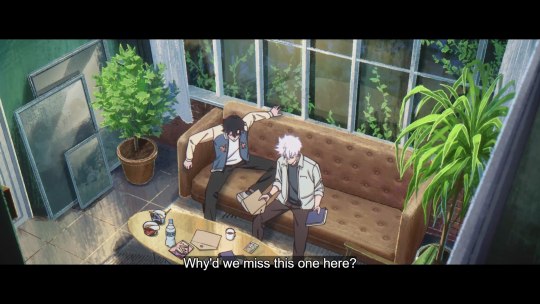
Some suspicious behaviour on Lu Guang's part. He's quite certain there are no useful clues in the last picture Yu Xia and Lin Zhen took in front of their shop, despite it being the only one taken by Lin Zhen (seriously! you could go to her house, look through her phone, the possibilities are endless!) and the fact that this is the photo Cheng Xiaoshi did end up solving the mystery in, thanks to the ticket stubs he found in her purse (see?) Secondly, they outright miss a picture in the envelope - the most important picture of all which would have given them the answer right away, since this was when the fragrant flowers were first used. Not your best work, Lu Guang.
...or is it? Lu Guang is pretty meticulous, and it's unlike him to slip up in such obvious ways. He's also skilled at slipping things back into envelopes when he doesn't want them to be seen, as we know. Could it be that he didn't want Cheng Xiaoshi to solve the mystery? But why? Maybe it's metaphorical, like so much else of this episode: he doesn't want Cheng Xiaoshi to uncover his true intentions. The fact that all this is ultimately for his sake.
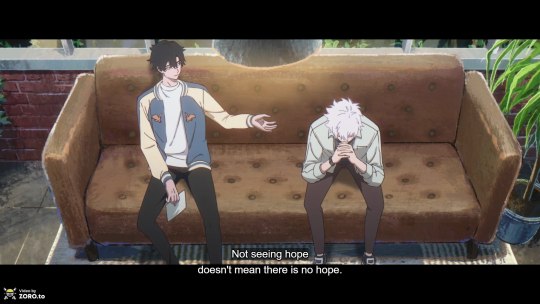
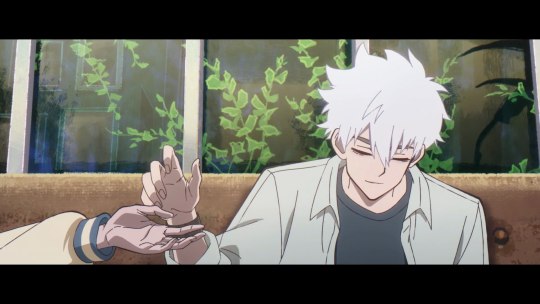
Interestingly, Lu Guang was very dejected at the idea of them seemingly being out of luck - they'd tried so many times and failed to fulfill the mission. Was he, perhaps, thinking about another mission he'd hate to fail? Anyway, it falls to Cheng Xiaoshi to cheer him up and give him hope for another try, which he accepts, with a small but genuine smile. My heart.
If you've scrolled this far, I'm glad you enjoyed my ramblings! I must say I don't know much about how Tumblr works so apologies if I mess up on formatting or tags, but I'll probably get the hang of it soon enough. I'll also probably end up enjoying Tumblr more than Twitter since it allows me unfettered yap space and won't feed my writing to the machine (yet). It's late and I should probably stop stop thinking bout it around now... but look forward to more random ramblings and thank you for reading!
#link click#shiguang daili ren#link click spoilers#sgdlr#shiguang#lcs1e2#cheng xiaoshi#lu guang#analysis#noodle lesbians#you can't have me watch a series about time shenanigans and expect me not to theorycraft
62 notes
·
View notes
Text
Sendoh Akira: A Character Analysis (Translated)
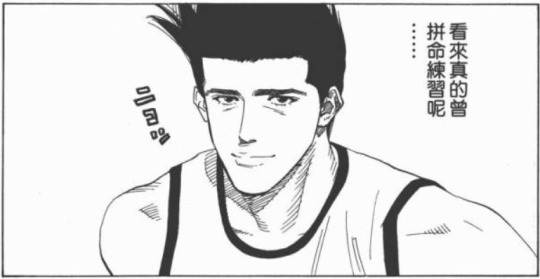
One of the best and most memorable Slam Dunk character analyses I’ve ever read was actually an answer to a question hilariously titled: “How do I marry Sendoh Akira?” (Author: 木子妞 - Link). The first half of the answer was particularly incisive and made me consider things I'd never noticed about Sendoh.
The original is in Chinese but here's an English version of the first half thanks to a nifty translating tool (I've edited for clarity and brevity; parts in bold for emphasis). Let's dive in!
~ Start of translation ~
Question: How do I marry Sendoh Akira?
Answer: 1) MENTAL SPEED
First, you have to be excellent - not in a Mary Sue protagonist way with incredible beauty and tremendous wealth etc.— these aren’t relevant in Sendoh’s eyes. Instead, your emotional intelligence needs to be genuinely outstanding.
Why? Because it’s important to understand Sendoh Akira as a person, and he’s not an easy person to understand. I’m not talking about his interests either; those are secondary; it's mainly about understanding his inner world.
The thing is, Sendoh is actually a very lonely person, and I think this loneliness is not by choice. No one in Ryonan really understands him; they are not on his level and don’t genuinely understand him. Case in point: in the match against Kainan, right at the end of regulation time Sendoh went for a dunk but deliberately went at a slower speed to allow Maki to catch up to him.
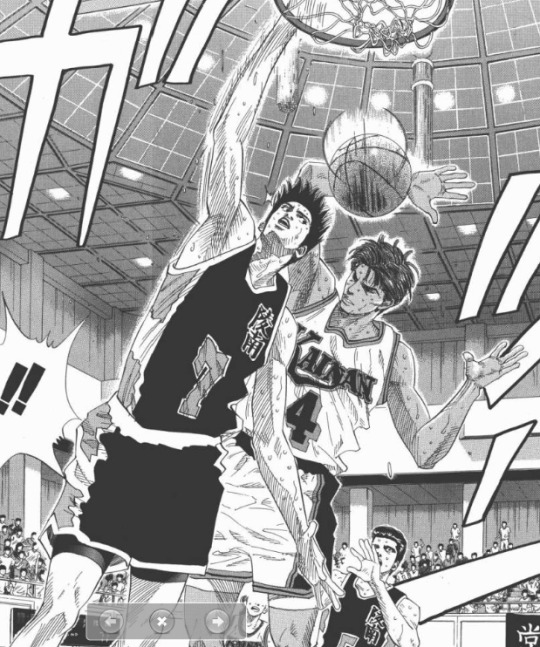
Sendoh’s idea of drawing a foul from Maki to turn the shot into a 2+1 would’ve meant that Ryonan would win the match by a point. But in that entire arena, only Maki, Fujima and Aida understood this plan. Even Coach Taoka got excited about getting into overtime without realizing that if the 2+1 plan failed, Ryonan would almost certainly lose.
Sendoh's mind works too fast for most people to keep up with, and his standards are high. He also can’t be bothered to explain more than is necessary and so as a result is forced into solitude. Which is why if you want to draw his attention, you need to be sharp enough to keep up with him mentally — imagine how high your IQ must be for that!
2) IDOLISATION
Second, don’t treat Sendoh like a genius or idealise him too much, and definitely don’t put him on a pedestal to worship. Accept the real him, including his flaws. And there are a few.
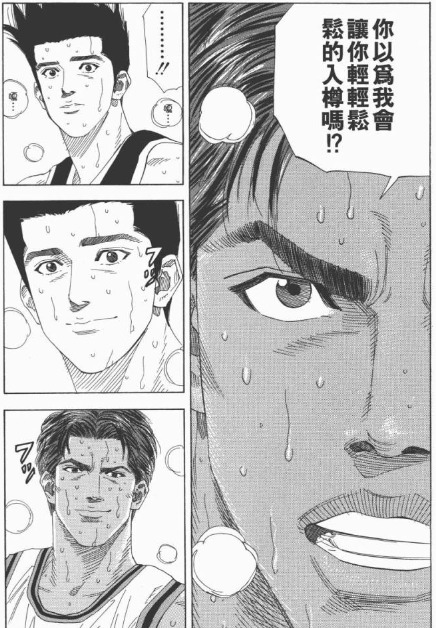
For one, Sendoh is quite stubborn. In the aforementioned match against Kainan, Maki at one point said, "Don’t think I'll let you dunk easily." To which Sendoh responded, "I'll definitely dunk to show you. Just once in this match..." And he was as good as his word, pulling off the dunk right at the end of regulation time as part of the aforementioned 2+1 plan.
Sendoh also holds grudges. In the prefecture match against Shohoku, after Miyagi managed to score against him, Miyagi mocked him, saying, "Did you think I'd always wait for you to block?" Later, when Sendoh noticed Shohoku was running into foul trouble, who did he target first? Who did he go after to draw another foul? Miyagi.
Sendoh can also be petty. When Rukawa scored quickly, everyone marveled at the speed of his shooting that even he, Sendoh, couldn't block, and Sendoh responded by scoring right away using the exact same technique as Rukawa.
In other words, the so-called basketball genius/living legend isn’t necessarily the real Sendoh Akira himself. Sendoh the basketball player gets lionised a lot but the real Sendoh actually has a temper.
The main difference that sets him apart from others is that he isn’t as easily bothered by things. Sendoh is more mature than his peers, and he’s able to keep most of his emotions in check or bury them deeper so it's harder for people to notice them.
But if you really want to draw his interest on the romantic front, you’ll need to treat him as an ordinary person. That’s how you'll earn his respect. To be clear, it’s not about playing hard to get; it’s about seeing him with a calm mind.
Because of Sendoh's relatively mild temperament and easygoing nature, when it comes to piquing his genuine romantic interest, Sendoh Akira is the most difficult man to deal with in all of Slam Dunk. Much more difficult than Rukawa.
Rukawa can be lured by some top class basketball intel, but Sendoh Akira has almost no weak points to exploit, precisely because so little gets him worked up. The only seeming weakness is his loneliness.
If you can 1) make him feel understood and 2) do so without needing to say it out loud, then you might have a chance with him. These two points are prerequisites. And if you feel you could pull off both points and truly love him to the point of marrying no one but him, then continue reading for some specific methods, though they're not guaranteed to work.
~ End of translated first half ~
We'll skip the second half since it's not that relevant in terms of character analysis. (But it is worth a read if you are a Sendoh fan. It covers a rather elaborate plan!)
On the topic of Sendoh, I would also add that him misremembering Sawakita's name isn't pure coincidence/a gag but perfectly in keeping with his character IMO. He seems the type that is competitive right in the middle of a match but once the match is over, he doesn't hold on to losses as tightly as, say, Rukawa. I mean, let's face it. If the same thing happened to Rukawa (losing big time to Sawakita) you can bet he'd remember Sawakita's name till the end of time. But Sendoh doesn't take such losses quite so personally, and that's why he'd be the type to misremember the name of someone who beat him.
76 notes
·
View notes
Text

alright! we got one whole person interested, so here's my hot take:
the first "how to train your dragon" movie is WAY better than httyd 2.

i know everyone loves like, the cool warrior mom design, the romance and the "epic animation moments" in 2... but can we for a moment be honest and say the whole "hiccup becoming a leader / which dragon is the Good Alpha" plot was dumb as hell? also, the villain sucked?
the original httyd is pretty good about keeping the structural problem grounded in real societal fears. namely, fear of the unknown and of beasts. it makes sense for any ol' village dealing with such a problem. it was intelligently designed around a solid premise.
httyd 2 is like. actually, dragon taming is a big thing, even outside berk. and theres a Scary Foreign Man dragon tamer who is bad and just wants power. it's okay to other him. being a good guy is about being a protector instead of an evil, power-hungry guy... which hiccup never was anyway... so no real growth there. just be good instead of bad. wow. what a theme. very thought-provoking.
people act like httyd 3 being bad came out of nowhere, but httyd 2 was the original sin to me. it totally dropped the societal themes in favor of generic good vs evil fights and "worldbuilding" - despite having no more interesting stories to tell.
it also kind of ruined hiccup for the sake of developing him. like. his whole thing is that he can't fight, so he has to find other ways to contribute to society. he's the anti-macho hero. which ends up being important in convincing the village that dragons can be peaceful. he's empathetic to the other, because he's been othered.
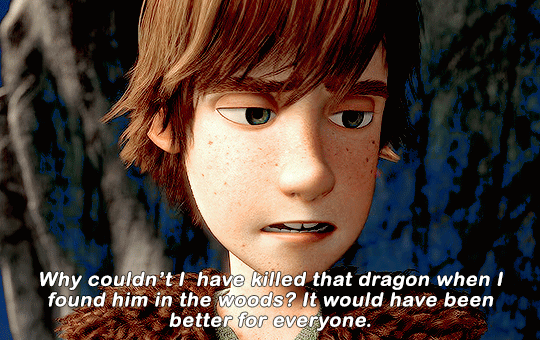
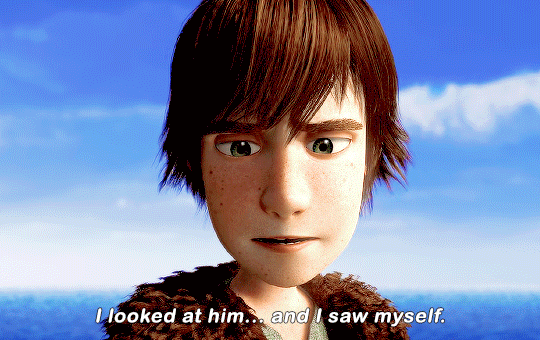
meanwhile in httyd 2, hiccup's like. Cool Warrior Man, who needs to step up and be the hero king when his dad dies. he can fight just fine, because he has a cool dragon to fight with. so he's just like any warrior, but one who fights with weapons instead of brute strength. aka most fictional warriors who arent just "the heavy."
the first movie isn't beyond criticism, obviously. the animation was a little meh compared to httyd 2 - i get why visually its seen as an upgrade. plus, httyd 1 also did the thing of having like a last minute evil dragon to defeat... but that wasn't the point. the POINT was the village and its fears. the POINT was overcoming that.

whenever people list why they love httyd 2 and consider it superior, its like... lists of details. like, look at the upgraded character designs, the cool flying scenes, the affection between hiccup and astrid, or the clever way hiccup's prosthetic leg is designed.
but these are film *details*, not fundamentals.
if you told me the sequel to httyd was going to have a much more generic story, ignore the themes of the original and makes its deliberately lanky and weak protagonist into Handsome Hero Warrior Boy, i'd be like. that sounds kinda bad. but the Animation Details (tm) i guessssss
i know hiccup is still "himself" in 2 to some extent, btw. he's an inventor, he's intelligent, and he initially tries to talk to the villain. but none of that ends up mattering. its arguably looked down on by the movie, which really, really wants him to step up to be the warrior king like his dad. aka a generic Hero Strongman.
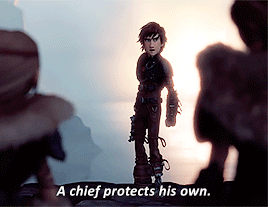
i'm not totally against evolving the themes of a work to fit new conflicts, btw. sequels should generally be different from the first movie. that's fine. that's expected.
but while the new conflict in httyd 2 IS born out of the results of the previous movie, that evolution feels very literal, not thematic.
namely, the evolution is "more people have dragons now." it builds the conflict from there. its based on worldbuilding, not on theme.
i don't think a very interesting evolution.
it kinda went from, in httyd 1: "the theme is fear of the unknown. how prejudice/ignorance manifests, educating oneself through compassion, the dangers of worshipping violent masculinity, and the importance of questioning what you're taught by society."
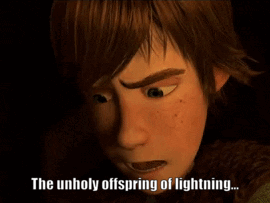
to, in httyd 2: "the theme is dragons. who has them? what they want with them? how can the Good Guy humans protect dragons from the Bad Guys? also, being a Good Leader means being a strong Hero Man who protects his friends," without asking any deeper questions related to the themes of the first movie.

and i'm like. guys. guys.
the theme shouldn't just be "dragons."
the theme of the first movie was NOT just "dragons." the first movie could've been about people being afraid of unicorns. or large birds. or unusually intelligent bears. it was not just about literal dragons, it was about societal fears and trying to overcome our base gut instincts.
i think this is what really plagues httyd 3: it builds on the themes of the second movie, not the first.
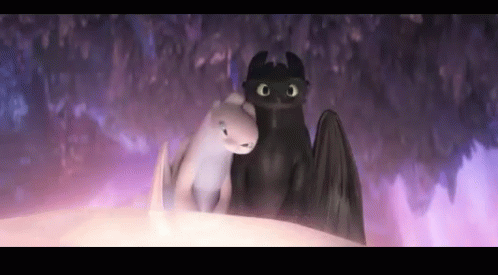
httyd 3 asks further questions that only really revolve around the literal relationship between humans and dragons. it does not understand any broader themes of what that relationship represents.
it clearly thinks its very intelligent for asking "what do the dragons themselves want?", but that question is not respected enough to be explored in any thematically coherent way.
the only real weight its given is the argument that there will always be "bad humans" out there, and so, dragons are safer in the wild. which sure is... an argument. but its a very "othering the problem" kind of argument.
it acts like its caring about the agency of dragons, but its not really. dragons were not actually portrayed as "oppressed" in berk society after the first movie, nor lacking agency. they were only at risk of "bad individuals", to which that solution is stupid. the racialized bad guy in httyd 2 didn't steal all his dragons from berk. he caught and subjugated them, mostly from the wild.

all while looking like... this, by the way. i feel like we don't talk about that enough. all the good guys are white nordics, while the only man of color is scary, domineering and cruel. in a series of movies that was once about having empathy for the other.
MAYBE if berk had been really oppressive towards dragons in httyd 2, we could've had a theme. maybe if they treated them like a dangerous commodity that must be tightly controlled despite their nominal acceptance and inclusion, we could've had a thematically tight 3-movie arc about like fear and oppression or whatever.
but that would require, yknow... making the movies be about broad societal problems, instead of just evil individuals. and only the first movie cares about making any real societal critique.
also, the solution in httyd 3 would've still sucked. these movies, in terms of writing, really decrease in maturity from 1, down to 2, to the plummeting depths of 3.
there is no relationship of oppression that is solved by completely segregating society and going our separate ways (httyd 3). just like there is no oppression that is solved just by defeating bad individuals (httyd 2). we have to learn to coexist as equals, to educate ourselves and be compassionate to the other. even if we're afraid.
that's the dream only the first movie kept in its heart.

#httyd#how to train your dragon#httyd 2#httyd 3#how to train your dragon 2#how to train your dragon 3#long post /#media analysis#media criticism#writing#ask to tag /#racism /
319 notes
·
View notes
Text
ES Starscream: What they took from him (last minute!)
I can't stop thinking about season 2 of Earthspark so I'm at it again. Overall I was mostly unbothered to the very last 10 minutes of the last episode, this last minutes made me so mad it's unbelievable. So what I'm gonna do now is list all the things that got screwed up in this short time, particulary how Starscream character got absolutely butchered.
Without further ado, that's the list: > Starscream lost any agenda. His agenda in this season wasn't good anyway ofc, but it was ANYTHING at the end of final episode he's just. gone. and that's it woohoo. > Starscream lost his respect among the Decepticons. It was interesting for me how we could see how obedient towards him they were, a bit in season 1 but mostly in season 2. Even Shockwave didn't dare to question him most of the time. I was waiting to discover why is that so. Maybe they knew he was capable of pulling a stunt like the one he did at the end of season 2 so far? But yea we will never know bc noone from Decepticons is going to stick around him now, and now Shockwave is the leader so gap has been filled. so fun. > He also lost his mission, his care for anything! cyberforming Earth was ment to serve the Decepticons, his fellow cybertronians. But first in the dialogue with Hashtag Starscream says he's doing it just for himself and then he just. Lost his mind i guess. > Speaking of Hashtag. Starscream in this dialogue with her twists his own words from "What Dwells Within" from season one. His words coming from genuine care we saw developing in that episode here are shown as somehow mischievious, as some stupid foreshadowing. Its completely insane how the show retrospectively is erasing everything that could make Starscream redeemable later on. Awful, absolutely awful. > Hashtag also says that his actions will make him worse than Megatron, and he accepts that. The intention of this specific line is super clear. It makes his relationship in simplistic reality of the cartoon somewhat less of a problem. Starscream is bad right, even worse than Megatron, so why bother. I fear that's the way this series closes the problem of Megatron's and Starscream's relationship, expecially with how earlier on in season 2 Megatron is framed as reasonable and the one trying to speak to him before the fight. I'm afraid we will never hear anything about them that makes sense in this show. And it's just so disappointing. > Starscream murdering two children (that's what Chaos Terrans are ok) which is. Oh my god. It's such a cheap move to make the character unredeemable. Not to mention how deaths of Aftermath and Spitfire were kiiiiiinda convenient for our protagonists. "uh oh how sad they are dead how could you Starscream :(((((( ok now lets get the Emberstone that is now complete thanks to them being dead :))))))" > About that scene. I hate it from different reason, too. Because the way Starscream treated Chaos Terrans, expecially Spitfire was a beacon of hope for me in this season. The way he was never violent towards them (even Breakdown kicked Aftermath! And Starscream never did anything like that, even when Twitch in Spitfire's body made a mess and ruined the equipment!). The way we could kinda see him getting closer with Spitfire, in the way that reminded me how kind he could be for Hashtag in season 1. And all of this absolutely ruined, none of this was relevant.

So that's all I've gathered, if you have something more feel free to add your observations! Starscream's character in season 1 is very dear to me, even if "What Dwells Within" isn't perfect I still loved it so I feel personally robbed by season 2.
#this is my roman empire#im sorry i cant stop thinking about it#its a tragedy really#maccadam#transformers#transformers earthspark#earthspark#earthspark season 2#earthspark spoilers#starscream#earthspark starscream#tf earthspark#look how they massacred my boy
62 notes
·
View notes
Note
How is no one talking about how the brar valley senate is only in slight dislike tier? I thought the fandom had unanimously agreed they were even worse than Riddle’s mom when that chapter 7 update came out. Surprised to see Riddle’s mom isn’t lower either, most people don’t like her for what she did to poor Riddle.
[My TWST character tier list can be found here!]



Ah, yes 😂 The TWST fandom’s top two enemies, the Briar Valley Senators and Mrs. Rosehearts... I find it kind of funny that on one hand we have some pretty politically powerful people to hate on but on the other hand we have someone who is comparatively very average and just your typical displeased angry mom that we also hate on… though in the end I guess both parties have harmed characters we care about, so they have that in common 💦
While I do think what the senators did to Lilia was (to put it as simply as possible) a dick move, I only slightly dislike them because this kind of political intrigue and social sabotage is what I looove to read. You can always count on old, conservative fictional politicians to stand in opposition to the change that the plucky young protagonists champion or represent. Terrible and alienating as the senators are, it sure does make for some tasty drama and informs a lot about why some of the Diasomnia boys turned out the way they did. I appreciate that worldbuilding, even if it does come at the cost of the senators not really shown to have a personality beyond being mad/intolerant of Lilia and sheltering Malleus.
I also slightly dislike Mrs. Rosehearts for similar reasons as the senators; yes, how she treated Riddle was rife with issues. However, I do believe she actually has a personality beyond being cartoonishly evil and genuinely cares for her son (but just uses very questionable methods). I think it's really interesting to consider their relationship--since Riddle appears to still love her--and the no doubt messy aftermath of it following their "talk" in book 4 (which we never got more details on). I talk at length about Riddle and how he may view his mother in spite of his trauma here; I'd recommend giving it a read!)
In my eyes... I can still enjoy a character even if they do or say deplorable things, so long as their words/actions provide something new or interesting to the lore or to other characters' backgrounds.
#twst#twisted wonderland#Riddle Rosehearts#Lilia Vanrouge#disney twisted wonderland#disney twst#book 1 spoilers#book 7 spoilers#notes from the writing raven#Malleus Draconia#book 4 spoilers
94 notes
·
View notes
Text
Every time someone says “Alastor is overrated”, a year is taken off my lifespan.
It’s a common occurrence, really. The popular male character with a lot of fans that may or may not think he’s hot always, always gets shat on. I’ve seen it. You’ve probably seen it too. And it’s birthed out of bitterness.
So, when people say “X is overrated”, what proof do they have?
“He’s a bad character!” Oh? In what way? Is he badly written? Do you not like his character arc (if any so far)? Do you not like his design? Do you think you could design him in a way truer to the creator’s vision of him? Do you think he’s just a bad person?
“He’s replaceable!” Is he, really? Could you completely remove him from the story and see nothing change? Could you, without changing the story, erase him from that story? Does his presence serve no purpose in that universe? And, even if he doesn’t, would his world be a brighter place without him in it?
“He has too much screen time!” Does he? Or do you just think he does? Is he one of the main characters? This other character has even more screen time than he does, are you going to complain about them too? Are only the protagonist and antagonist allowed to be on screen for any significant amount of time? Are you complaining about how many lines he has?
“Thirsty fangirls are sexualizing him too much!” Welcome to the internet. That’s what thirsty fangirls do. Have you never heard of Rule 34?
“He’s a bad person!” So what? Lots of characters are bad people. Duh. Not everyone can have sunshine in their hearts and butterflies in their eyes.
“He’s ugly!” You think he’s ugly. Hell, maybe his fans think he’s ugly, too. But someone out there is always going to be attracted to the unconventional.
“He’s a villain!” Wow, you identified the antagonist! You deserve a gold star! You must feel so proud! Now, can you tell me why people have been sexualizing the Devil for centuries?
“He doesn’t deserve the hype!” The hype had to come from somewhere. Did it come from the show? Did it come from the fans? Either way, someone thinks he’s really neat, and told all their friends about it.
“He doesn’t deserve to exist!” His creator sure thinks he does.
“He sucks!” Cock? Pussy? Both? Neither? A secret third thing? Either way, it’s none of your business, now is it?
“People ship him with everyone!” It’s okay, you can just say you’re jealous of how much he’s getting laid in other people’s heads.
“He’s cliche!” And? Every character is, in some way, a cliche. You’re a cliche. I’m a cliche. Everyone’s a cliche. But is he doing something interesting with the cliche?
And yes, a lot of these are things I’ve seen specifically about Alastor. But if you feel this way about any character, well, answer those questions. See if you make sense to yourself. Because there’s a difference between just not liking a character, and hating just to hate.
#hazbin hotel#alastor#the radio demon#tagging all the characters just in case#charlie morningstar#vaggie#valentino#vox#velvette#husk#angel dust#niffty#hazbin hotel adam#lute#hazbin hotel emily#lucifer morningstar#fandom discussion#this applies to so many fandoms#i can’t list them all#sanity checkpoint#do you have one (1) sane reason to hate this character#or have you just spent too much time on the internet#anti anti
43 notes
·
View notes